






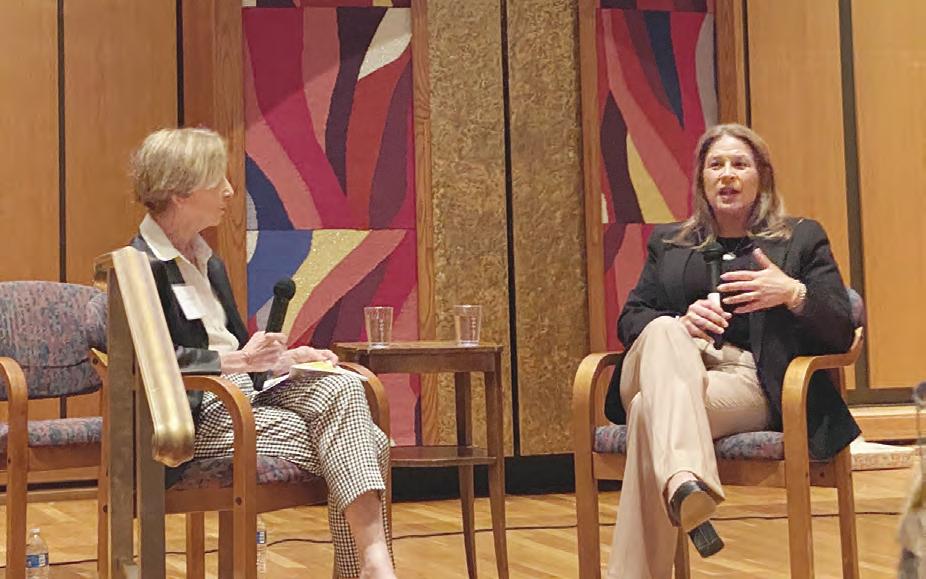
By Toby Tabachnick | Editor
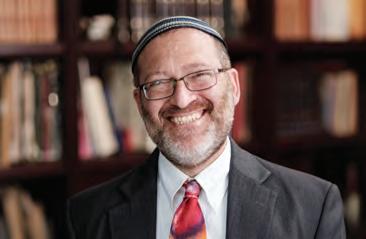


It’s been a challenging few weeks for Lori Shapiro, her husband, Pennsylvania Gov. Josh Shapiro, and their family. On the first night of Passover, just a couple hours after their seder, their residence was firebombed by an arsonist. The suspect reportedly told a 911 dispatcher that he set the fire because of what the governor “wants to do to the Palestinian people.”
But when the first lady of the commonwealth addressed Pittsburghers at the Jewish Women’s Foundation May 27 annual meeting, she stressed, “We are all doing OK.”
“The residence will be rebuilt and restored as quickly as possible, and we plan to welcome people back this summer,” she said.
Shapiro credited the first responders who ensured her family’s safety and thanked the community for the “outpouring of care and humanity,” which, she said, lifted their spirits.
The core of her message, though, was one of resilience and determination.
“I want you to know that our faith and commitment to the work we do has only been strengthened by this attack, and we will not be deterred from living our faith proudly,” Shapiro said. “We will again build a sukkah, host Shabbat dinners and join together for community seders at the
residence. And of course, we will continue to speak out against hate directed toward any of our faith communities, because an attack aimed against any person because of what they look like, where they come from, who they love or who they pray to, makes us all less safe.”
Shapiro’s life has been defined by service, Judy Greenwald Cohen, JWF’s executive director, told the crowd at Rodef Shalom Congregation.
Shapiro graduated from Colgate University and, while working as an information technology consultant, she pursued a graduate degree in science, technology and public policy from George Washington University. She served during the Clinton administration in the White House Office of Science and Technology Policy and was the liaison between the President’s Information Technology Advisory Committee and the White House.
After taking some time off to raise her four children, Shapiro became a trained parenting educator and she frequently volunteers in the community with organizations that tackle hunger and poverty.
During her address, Shapiro acknowledged, “We are living in a time where,
By David Rullo | Senior Sta Writer
Unification, it appears, isn’t always a unifier.
While many congregants of both Temple Sinai and Rodef Shalom Congregation are excited about the prospect of a merger, some others are concerned with issues of transparency, a perceived lack of critical information and differences in culture.
Several Temple Sinai board members, and one former board member, criticized the decision process.
None of those criticizing the process wanted to be identified by name.
Important questions, one Temple Sinai board member claimed, were not answered by members of the steering committee charged with leading the unification process.
That board member also was troubled by both the brit the board was asked to approve — the agreement that the two congregations wanted to merge — and a vote on a resolution by the board recommending the unification. They said the board “voted on the brit with modifications written in by hand,” and that they didn’t know “if those modifications were also approved by Rodef.”
Voting on the resolution was also an issue, the Temple Sinai board member said.
“I looked at what they passed out that we were about to vote on and realized that it was different from what we were emailed three hours before. They emailed us a draft resolution three hours before the meeting. There was no time for discussion. It was rushed through.”
For those reasons, the board member contended, a contingent of the board voted against the brit. According to the meeting’s minutes on the Temple Sinai website, 25% of the board voted against the brit. In the vote





By Adam Reinherz | Senior Staff Writer
Atree with international heritage has taken local root. Weeks ago, Anne Frank Center USA delivered a sapling to the National Catholic Center for Holocaust Education at Seton Hill University in Greensburg, Pennsylvania.
The gift, which was one of four trees distributed this year by the New York-based Anne Frank Center, stems from a horse chestnut tree in Amsterdam.
Made famous by Anne Frank, author of the eponymous diary, the chestnut tree was a symbol of optimism for the Jewish teenager.
Writing in her diary, Frank said as long as the tree exists, “How can I be sad?”
Twice more during her two years of hiding the German adolescent, who ultimately died of typhus at the BergenBelsen concentration camp at age 15, wrote about the tree while describing the changing seasons.
The tree, which attracted Frank’s attention during a hellish period, continues reminding others about Holocaust horrors and the necessity of future growth, Lauren Bairnsfather, CEO of the Anne Frank Center, explained.
“With each sapling planted, we are sharing Anne Frank’s love of nature with organizations across our coalition that have a common commitment to honoring Anne Frank’s memory through education, free expression and belief in humanity,” Bairnsfather said.
In delivering the tree to Seton Hill on May 7, university representatives and staff

SUBSCRIPTIONS subscriptions@pittsburghjewishchronicle.org
412-687-1000, ext. 2
TO ADVERTISE advertising@pittsburghjewishchronicle.org 412-687-1000, ext. 1
EDITORIAL DEPARTMENT
Email: newsdesk@pittsburghjewishchronicle.org
BOARD OF TRUSTEES
Evan H. Stein, Chair
Evan Indianer, Vice Chair
Derek Smith, Treasurer
Gayle R. Kraut, Secretary
Gail Childs, Dan Droz, Malke Steinfeld Frank, Seth Glick, Tammy Hepps, Judith Kanal, Cátia Kossovsky, Charles Saul
GENERAL COUNSEL
Stuart R. Kaplan, Esq.
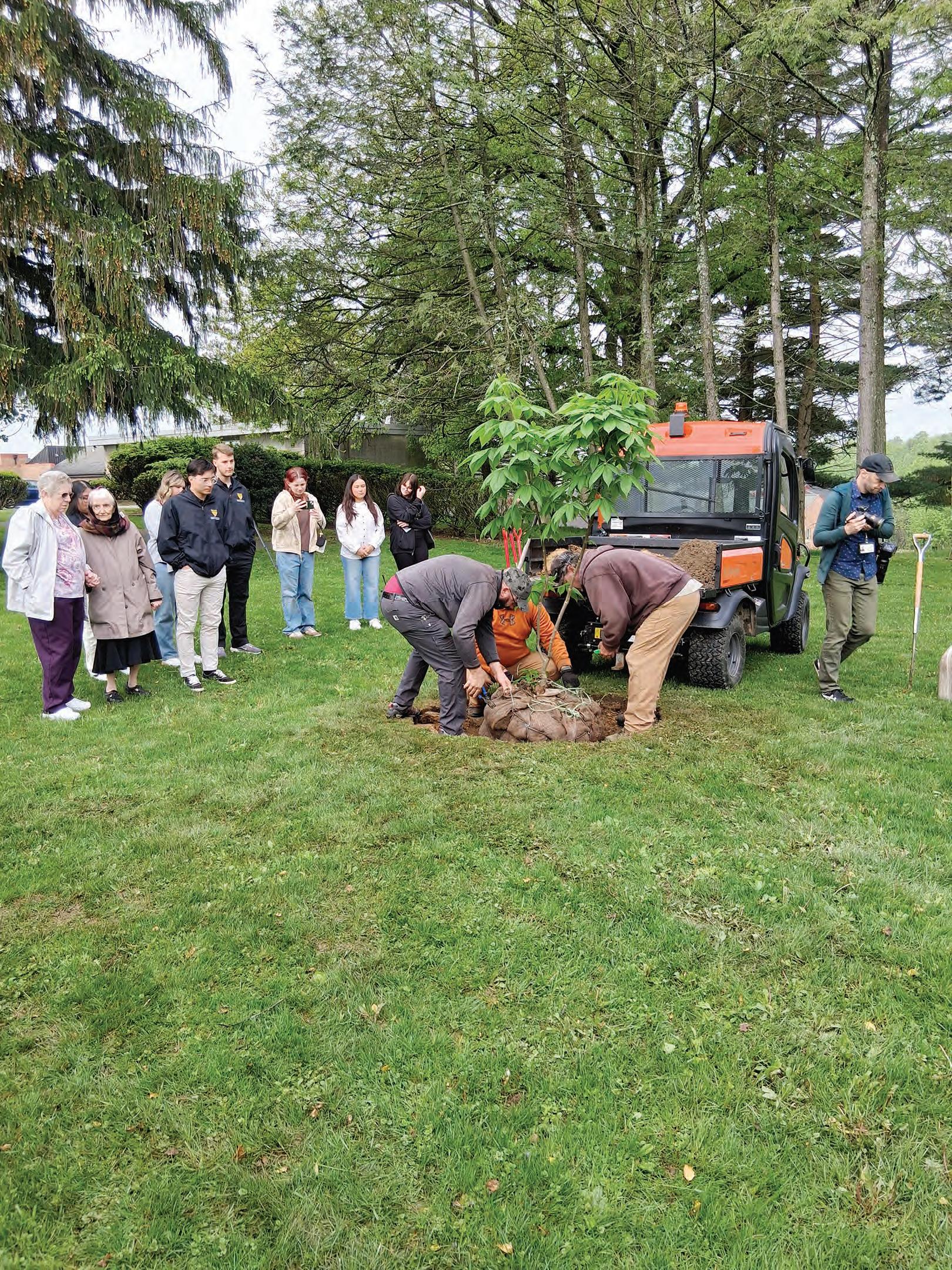
Subscriptions: 412-687-1000, ext. 2
Jim Busis, CEO and Publisher 412-228-4690 jbusis@pittsburghjewishchronicle.org
EDITORIAL
Toby Tabachnick, Editor 412-228-4577 ttabachnick@pittsburghjewishchronicle.org
Adam Reinherz, Senior Staff Writer 412-687-1000 areinherz@pittsburghjewishchronicle.org
David Rullo, Senior Staff Writer 412-687-1000 drullo@pittsburghjewishchronicle.org
ADVERTISING
Amy Weiss, Account Executive (412) 613-0697 aweiss@pittsburghjewishchronicle.org
PRODUCTION
Jeni Mann Tough
Production Manager
Carl Weigel
Art/Production Coordinator
Subscriptions subscriptions@pittsburghjewishchronicle.org 412-687-1000, ext. 2
Published every Friday by the Pittsburgh Jewish Publication and Education Foundation 5915 Beacon St., 5th Floor Pittsburgh, PA 15217
Phone: 412-687-1000
POSTMASTER: Send address change to PITTSBURGH JEWISH CHRONICLE, 5915 BEACON ST., 5TH FLOOR PITTSBURGH, PA 15217 (PERIODICAL RATE POSTAGE PAID AT PITTSBURGH, PA AND AT ADDITIONAL MAILING OFFICES) USPS 582-740

Manuscripts, letters, documents and photographs sent to the Pittsburgh Jewish Chronicle become the property of this publication, which is not responsible for the return or loss of such items.
The Pittsburgh Jewish Chronicle does not endorse the goods or services advertised or covered in its pages and makes no representation to the kashrut of food products and services in said advertising or articles. The publisher is not liable for damages if, for any reason whatsoever, he fails to publish an advertisement or for any error in an advertisement. Acceptance of advertisers and of ad copy is subject to the publisher’s approval. The Pittsburgh Jewish Chronicle is not responsible if ads violate applicable laws and the advertiser will indemnify, hold harmless and defend the Pittsburgh Jewish Chronicle from all claims made by governmental agencies and consumers for any reason based on ads appearing in the Pittsburgh Jewish Chronicle
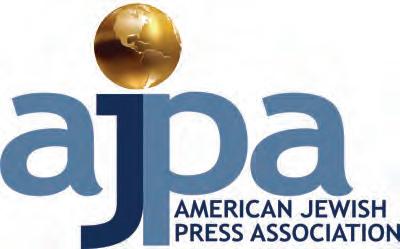

the house of Israel brought up the ark of God with shouts and with the sound of the shofar.”

By Adam Reinherz | Senior Staff Writer
After most of its books were boxed and tributes paid, a task remained for Temple B’nai Israel: gifting its final Torah. The transfer, which occurred on May 27 in Squirrel Hill, marked the end of a nearly 18-month process. At its start in December 2023, B’nai Israel’s President Lou Anstandig told the Chronicle the 113-year-old White Oak-based congregation would close in May 2025.
The announcement afforded time to proceed in an “orderly fashion” and “leave with dignity,” Anstandig said. “We didn’t want a situation where it was the last man out, shut the lights.”
So, for more than a year, the congregation’s leaders followed requisite steps to close their spiritual home. They sold the building. They partnered with the Jewish Cemetery and Burial Association. They hosted a final service. They preserved their records. They buried sacred writings. They gifted two Torahs: one to a Cleveland-based Jewish group, the other to Makom HaLev, an independent havurah in Pittsburgh.
Finally, more than a year and a half after announcing the closing, Anstandig, Rabbi Howie Stein and other B’nai Israel representatives traveled 10 miles northwest to donate their final Torah.
Waiting for the White Oak group and its sacred scroll were dozens of clapping children. Lining the outdoor walkway to Community Day School, scores of kindergarten, first and second graders awaited the procession.
As B’nai Israel leaders gathered in the Jewish day school’s parking lot, music blasted from a nearby speaker. Stein walked the Torah from a concrete stretch, down a ramp and into the building. Behind him were the congregation’s leaders, young learners and teachers.
Attendees quickly found seats. Casey Weiss, CDS’ head of school, asked the pupils which of them considered 113 years a “long time.”
Numerous hands raised. Weiss invited Anstandig to the podium.
“David went and brought up the ark of God,” Anstandig said before continuing the biblical passage from 2 Samuel. “David danced with all his might before God; David and all
Reciting a verse often sung on the holiday of Simchat Torah, second grader Leah Seltzer said, “Atah horaeita ladat, ki Hashem hu haelokim ein od.”
“Hashem is our God, there is no one else beside him,” Weiss said.
In unison, first graders rose and chanted the Shema, a prayer often deemed the watchword of the Jewish faith.
“This sacred scroll is more than just words,” Weiss said. “It is our history, our identity and our lifeline.”
Chairs were cleared and tables moved. The speaker sounded music again, and for nearly 15 minutes students, staff and visitors danced with the sacred parchment.
Stein passed the scroll to Cantor Barbara Barnett, a Hebrew and Torah teacher at the Jewish day school. Moments later, the Torah was in Weiss’ hands, then Anstandig’s, then students’.
As celebrants danced in a circle, children took turns holding the Torah, kissing its cover and eating Hershey’s Kisses.
“In Psalms, it says, ‘How sweet are your words? To my taste, sweeter than honey.’ The Torah is indeed as sweet as honey,” Weiss said.
on site. They casually sat around a table drinking coffee and enjoying snacks from the earlier celebration.
“Many months ago, we started to talk about what will we do with the Torah scrolls,” Anstandig said.
The decision was made to give them to organizations that lacked their own Torah. Before B’nai Israel selected recipients, Weiss reached out.
“I wrote them an email, not expecting a response, and in the email I spoke — as I always do — about the importance of day school education, and of Torah learning, and of us raising proud Jews,” she said. “I did my pitch, did my spiel, and then I actually got a call from Lou, their board president, stating that we had been chosen.”
The phone call, Weiss continued, was “better than gold, better than any donation in some ways.”
For years, Community Day School has had Torahs on site, but the scrolls were on loan from local congregations; that this Torah went from the hands of congregants to young students is a “perpetuation of the Jewish story,” Weiss said. “Our kids will learn how to read it, and touch it and kiss it. And that is amazing.”
“These children are our future, and now we are able to do something to carry on our Judaism,” Rosalie Anstandig told the
of emotion attached to that — but there’s also, as we saw this morning, with all the singing and dancing, there’s a great sense of joy that the history of the congregation will continue to live on in the legacy we leave behind,” Stein said.
Seated near the rabbi, congregant Janice Greenwald recalled being married at B’nai Israel and being a member, with her husband, for almost 60 years.
Lindi Kendal mentioned her grandparents, both sets.
“My family was there at the beginning,” she said.
Whether it’s the Torahs, yahrzeit boards or other items, it’s nice seeing so much of B’nai Israel’s physical history shared, Ron Kendal said.
As the reflections continued, several B’nai Israel representatives spoke about their children and grandchildren — some of whom attend CDS — and said the Jewish day school needed its own Torah.
For Weiss, the morning spurred a memory. Months earlier, the educator accompanied her children to the opening of the Hillel Academy Yitzy Sutofsky Campus. She recalled seeing a Torah, donated in memory of the late student, marched down Beacon Street in Squirrel Hill.
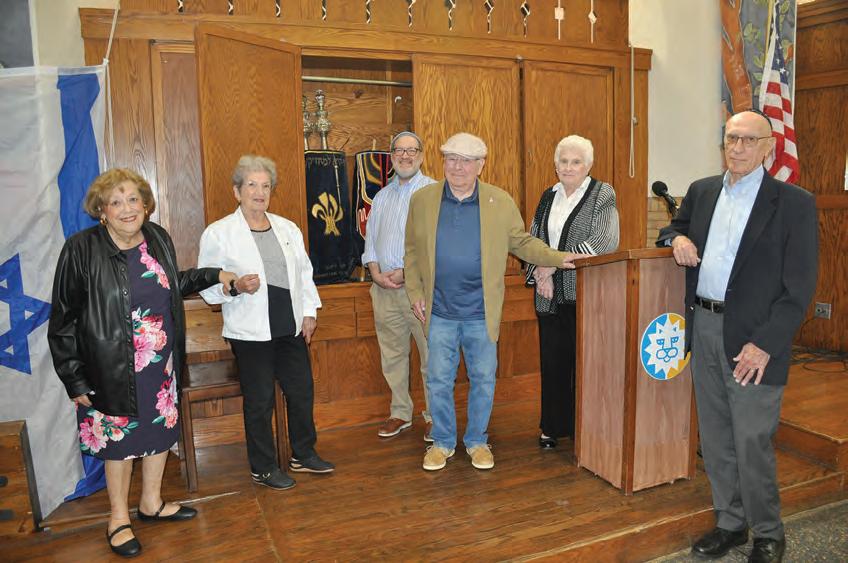
“It just struck me at that time how amazing it was to see my own children cheering for the Torah, eating candy, kissing it, dancing with it. I really wanted the kids at our school to be able to experience that,” she said. Weiss called the May 27 celebration “beautiful and sweet,” because it enabled “children at CDS to touch a Torah, hold a Torah, eat a Hershey’s Kiss, and really understand the palpable beauty of getting something of this magnitude.”
Whether for bar and bat mitzvah preparations, day school services or other study, tudents and staff will use this scroll for “many, many years to come,” Weiss said.
Hours after arriving in Squirrel Hill, B’nai Israel representatives exited the school and returned to the parking lot. They spoke about the conclusion of a 113 year-old congregation. Before getting in her car, Lindi Kendal told the Chronicle, “Every ending has a new beginning, and what better new beginning could there have been for this Torah.” PJC
Adam Reinherz can be reached at areinherz@pittsburghjewishchronicle.org.
How does your family feel about leaving Pittsburgh?
By David Rullo | Senior Sta Writer
Rabbi Howie Stein has been a fixture in Pittsburgh’s Jewish community since finishing rabbinic school in 2009 and moving here with his wife, Debbie Swartz, for her job with the Jewish Federation of Greater Pittsburgh. Stein worked at several different synagogues, including Temple Hadar Israel in New Castle and Temple Beth Israel-Shaare Zedek in Lima, Ohio, before serving as rabbi at Temple B’nai Israel in White Oak.
With the closure of the suburban Reform congregation last month, Stein was again looking for work — but he wasn’t unemployed for long. He was recently named the rabbi of Temple Emanuel in Roanoke, Virginia. As Stein, Swartz and their 12-yearold daughter, Yona, prepare to leave Pittsburgh, the rabbi spoke with the Chronicle about his time in the city and what the future holds.
The interview has been edited for length and clarity.
We’re all going to miss Pittsburgh, the community and the people we’ve become close to. My daughter is nervous and excited at the same time. There’s a lot of big changes happening but she’s looking forward to a new adventure.
Can you talk about some of the highs and lows of your time in the city?
I’ve certainly participated in a range of community activities. Whether it was teaching at Tikkun Leil Shavuot, interfaith dialogue groups, serving in a freelance capacity, officiating at funerals and my first wedding. I’ve read Torah at Beth Shalom for the last 11 ½ years. My daughter started coming to minyan with me before she could walk. Being able to share, even when somebody’s at a place of loss — it’s been an honor to be able to bear witness to that and help them through the process of burying a loved one. Those, and the connections we made were the highs.

minyan at Beth Shalom because you are a Reform rabbi.
I think that my path has walked along the line between the Reform and Conservative movements. I think those boundaries are not as clear-cut as people within the organizations like to think of them as being.
What are some of the lessons you’ll take away from your time in Pittsburgh?
The idea that community transcends any one institution, of working with the unaffiliated, knowing that when they suffer a loss there’s a need to connect with the tradition — I think that has been a very powerful experience for me. And, knowing that there can be good relations between Jews and non-Jews despite the many challenges that have popped up over the years.
What excites you about your new position?
We’re excited to start a new adventure. I’m excited for this opportunity, and my family is excited for it, as well. Had there been the right position in Pittsburgh, I think we would have stayed but we have no reservations about leaving to pursue this new opportunity.
I think the low was wanting a full-time position and not finding the right place. I wanted a full-time position for a while, and it’s finally worked out.


My father grew up in the classical Reform mold, my mother with a secular, cultural Jewish identity. Both had very strong identities. My path has been more traditional. Growing up in the Reform movement, I have a strong affinity for the movement, for the people who make up the movement, even as my personal practice has hewed more Conservative. I’ve gone back and forth and that’s served me well in most of the congregations I’ve served because they’ve had congregants from all different backgrounds. I’ve been able to reach out to all of them in different ways.
What will life be like for you in Virginia?
My daughter will go to public school, there’s no Jewish day school. I think that’s part of the adventure for her. It’s a smaller city than Pittsburgh. It has two synagogues, one Reform, one Conservative. There’s a nice mix of people in the community who have been there for several generations — they came 30 years ago, thought they’d stay five years and are still there. People have also come recently because, like Pittsburgh, the economy has revived in the post-industrial age. Virginia Tech’s medical school is in Roanoke so there’s a trauma center, a cancer center and a cardiac center.

Is that a plus, that Pittsburgh has a lot of fluidity between movements?






Absolutely. Tonight is Shavuot and we’ll have a wonderful community event that brings together people from across the denominational spectrum, and people who aren’t necessarily affiliated but are attracted to the event. In Pittsburgh, we see the joke that belonging to more than one synagogue is de rigueur. But I think that fluidity — the boundaries being porous — is true everywhere, whether people want to admit it, or not.
And what will you miss about Pittsburgh?
Certainly, the people. Roanoke has a cultural scene but it isn’t like Pittsburgh. It’s a smaller Jewish community, so I’ll be one of a few rabbis instead of a large cohort. We’ll miss Pittsburgh but we’re looking forward to the future. PJC
David Rullo can be reached at drullo@ pittsburghjewishchronicle.org.

NOWPARTNERING WITH



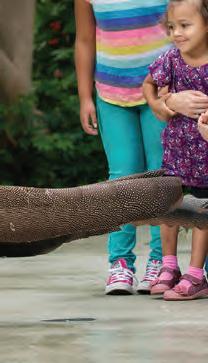
NOW PARTNERING WITH

NOWPARTNERING WITH

NOWPARTNERING WITH
NOWPARTNERING WITH
NOWPARTNERING WITH
an ischemic stroke survivor interested in improving arm and hand function? Vivistim may be right for
Areyouan ischemicstroke survivorinterestedin improving armandhandfunction?Vivistim mayberightforyou!


Areyouan ischemicstroke survivorinterestedin improving armandhandfunction?Vivistim mayberightforyou!
Areyouan ischemicstroke survivorinterestedin improving armandhandfunction?Vivistim mayberightforyou!
Call us at 412-414-1988 for more info or to schedule an evaluation! www.tolifefitness.com
Areyouan ischemicstroke survivorinterestedin improving armandhandfunction?Vivistim mayberightforyou!
Areyouan ischemicstroke survivorinterestedin improving armandhandfunction?Vivistim mayberightforyou!
Callusat 412-414-1988 formoreinfoorto scheduleanevaluation! www.tolifefitness.com
Callusat 412-414-1988 formoreinfoorto scheduleanevaluation! www.tolifefitness.com
Callusat 412-414-1988 formoreinfoorto scheduleanevaluation! www.tolifefitness.com
412-414-1988 formoreinfoorto scheduleanevaluation! www.tolifefitness.com Are
Callusat 412-414-1988 formoreinfoorto scheduleanevaluation! www.tolifefitness.com
Callusat 412-414-1988 formoreinfoorto scheduleanevaluation! www.tolifefitness.com
By Deborah Weisberg | Special to the Chronicle
Helping Jewish families navigate divorce in a healthy, holistic way is the impetus behind a unique pilot program set to launch in Pittsburgh sometime this year.
Divorce First Responders is aimed at providing strategies to clergy, mental health workers, lawyers and other professionals to better help divorcing individuals during a deeply stressful time.
The program is open to members of the general Jewish community as well, including those who are divorcing and the family and friends who want to support them, according to presenters Batsheva Ganz, a licensed mental health counselor, and Rabbi Ezra Weinberg, who founded Jews Get Divorce, a network of resources for Jews going through divorce.
Ganz and Weinberg have drawn upon their own experiences with divorce to develop the pilot, which is being sponsored by the Jewish Women’s Foundation of Greater Pittsburgh and the SteelTree Fund of Jewish Federation of Greater Pittsburgh.
“Our program is definitely based off the deep passion Ezra and I both have to try to create change in divorce support within Jewish communities,” said Ganz, who lives in Florida and met Weinberg at a retreat after he separated from his wife. Weinberg, of Philadelphia, was familiar with Ganz’s work through online courses she offered for divorced parents, “and she pulled me into her orbit,” he said. Their partnership is strictly business and evolved out of a shared belief that dealing with divorce is not just an individual challenge, but a Jewish community responsibility.
Through lectures, experiential exercises and group discussions, Divorce First Responders is designed to provide those to whom people turn during divorce with the tools they need to be more effective, according to Weinberg.
“Divorce is a spiritual and social rupture as well as a legal process,” he said. “We want to create many kinds of on-ramps for people to access when going through the process.”

explained.
“There’s a whole world of divorce coaching out there, including divorce doulas for the separation period, and special resources for high conflict divorces. People need to know they exist.”
A survey they conducted of divorced Pittsburgh Jews indicates the need exists, Ganz said, noting that just over 52% of those queried felt “somewhat supported” by the community while about 38% felt “not at all supported.”
More than half of survey respondents said they did not seek guidance from a rabbi or religious leader during their divorce, and among those who did, 45.5% said it was “not helpful at all.”
Weinberg and Ganz favor collaborative divorce, an alternative to litigation in which trained, certified professionals negotiate settlements for their clients outside of court. “We’re big fans of it,” Ganz said. “The legal process can get very messy and expensive and hard to back out of once you start.”
Divorce First Responders is being marketed to secular as well as practicing
Jews of all denominations from Reform to Orthodox, where support is often more limited, Weinberg said.
“Divorce is more normal in the nonreligious world, and so there are more resources available to unaffiliated Jews. In the religious world, which is so familycentric, there’s a stigma around divorce. It comes with a deep shame that is pushing people away.
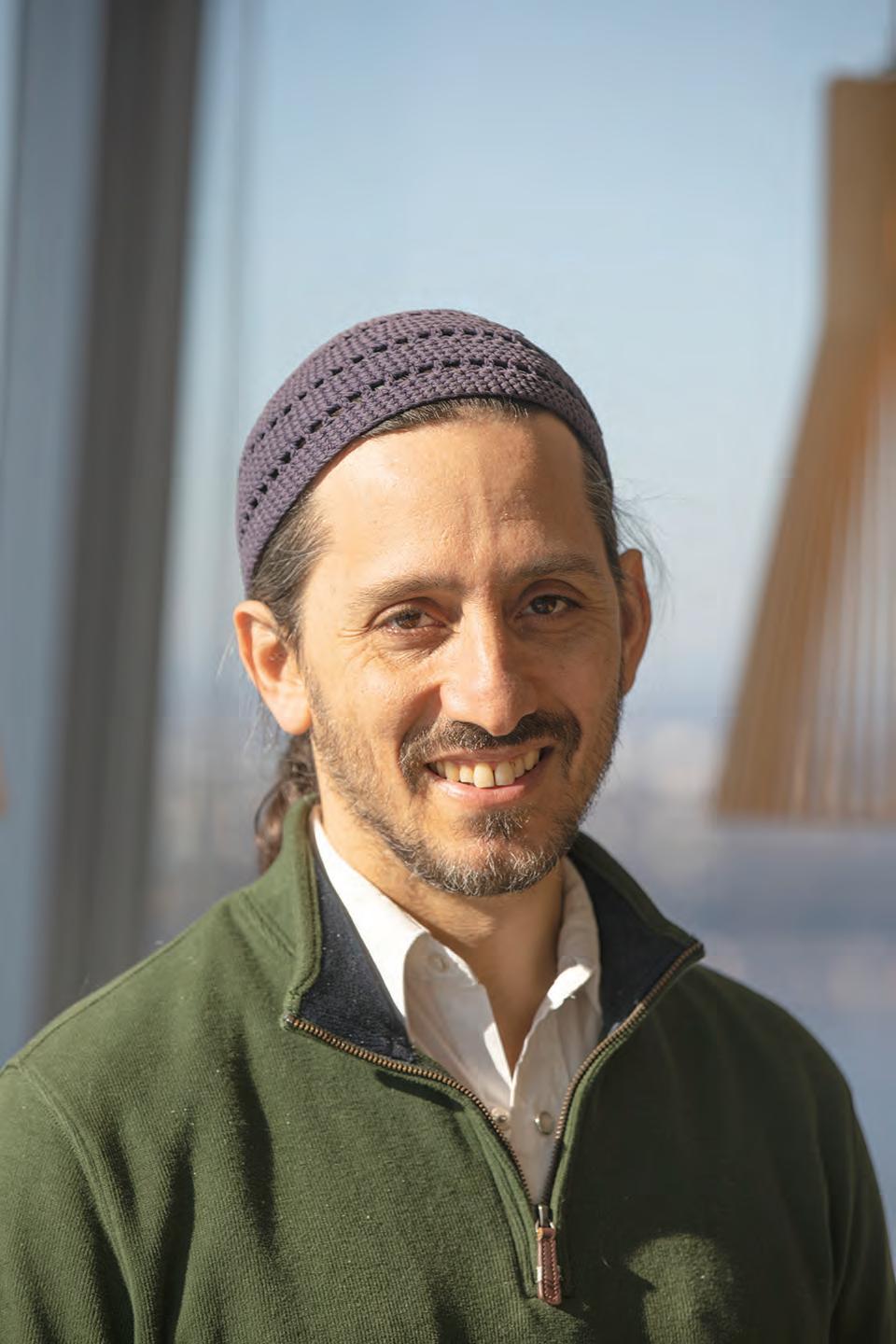
Jewish Women’s Foundation is spon soring Divorce First Responders because of “the innovative thinking at play,” the foundation’s Executive Director Judy Greenwald Cohen said.
“There’s rarely education around the divorce,” he added, “yet it is a central, ancient practice that’s actually sacred.”
Speaking anecdotally, Ganz sees a preponderance of divorce in Jews over 50, and in Orthodox Jews in their 30s and 40s “who married when they were young, had a couple of kids, and then realize that their lives have changed.”
Ganz, 43, went through an Orthodox divorce 11 years ago.
Weinberg, 50, a Reconstructionist rabbi, said Jewish clergy don’t routinely receive training on how to deal with couples in crisis.
“In my five years at rabbinical college I did not have units or conversations about family systems,” he said. “Jews are good at handling life moments, like marriage and births. When
“Divorce is a terrible thing for any family to go through, especially women. Household income drops, so there’s often increased financial inequity and stress. Women are usually the primary childcare givers, so the emotional stresses of coparenting fall more heavily on women.
“There’s also the stigma, in some ways, of walking into a synagogue or social group, which can be challenging,” she added. “There are a lot of issues and we want to raise awareness.”
Ganz and Weinberg invite people to email them about their personal experiences with divorce at divorcefirst responders@gmail.com. PJC
Deborah Weisberg is a freelance writer living in Pittsburgh.
$2.5 million grant awarded to Tree of Life by the Richard King Mellon Foundation
— LOCAL —
The Pittsburgh-based Richard King Mellon Foundation has awarded The Tree of Life a $2.5 million grant. The funds will be used to help The Tree of Life transform “the site of the deadliest antisemitic attack in the United States into a national center for education, remembrance, bridge building and the celebration of Jewish life and culture,” according to a news release.
“The Richard King Mellon Foundation’s grant comes at a critical juncture for The Tree of Life and the broader Jewish community,” Carole Zawatsky, CEO of The Tree of Life, said in a prepared statement. “Our mission to uproot antisemitism and hate is of the utmost importance at this moment. We are incredibly grateful for the Foundation’s generosity and continued support, which is symbolic of our core belief that antisemitism is an American problem and all of us — Jewish and not — must work together to counter it.”
The Tree of Life had a groundbreaking ceremony in June 2024. Construction has not yet begun at the site.
The Mellon Foundation’s total investment in The Tree of Life to date is $3.5 million, according to the news release. The new gift follows the opening of “Lessons from The Tree of Life: Lighting the Path Forward,” at the Maltz Museum in Cleveland. The traveling exhibit includes memorial items left the Tree of Life building or sent to survivors or family members of victims following the deadliest antisemitic attack
in U.S. history.
“The Tree of Life continues to lead in their efforts to build relationships across differences through impactful and innovative programs,” Sam Reiman, director and trustee at the Richard King Mellon Foundation, said in a prepared statemen. “At a time of dramatically increased antisemitism and hate, investing in education and fostering connections within local communities is of essential importance.” PJC
— Toby Tabachnick
Submit calendar items on the Chronicle’s website, pittsburghjewishchronicle.org. Submissions also will be included in print. Events will run in the print edition beginning one month prior to the date as space allows. The deadline for submissions is Friday, noon.
FRIDAYS, JUNE 6, 20
Join Chabad of the South Hills for Baby Loves Shabbat, music and movement for ages 0 to 3. Challah making and Shabbat songs. 3:45 p.m. 1701 Bower Hill Road. chabadsh.com.
SATURDAY, JUNE 7
Join the Tiferet Project for its June Havdalah on the Town (HoTT). Enjoy a short and joyful ritual to end Shabbat and begin the new week. Noshes, a signature cocktail, music and great conversations included. Stay for just the ritual or join others for dinner afterward. Address supplied after registration. 6 p.m. tiferetproject.org/event/ hott-jun.
SUNDAYS, JUNE 8–DEC. 28
Join Chabad of Squirrel Hill for its Men’s Tefillin Club. Services and tefillin are followed by a delicious breakfast and engaging discussions on current events. 8:30 a.m. 1700 Beechwood Blvd. chabadpgh.com.
MONDAY, JUNE 9
Join Chabad of Squirrel Hill for The Sound of Jewish Music, a magical evening for women featuring music, dance and inspiration. 6:30 p.m. $18/adult, $10/student in advance; $25 at the door. Katz Performing Art Center, 5738 Darlington Road. soundo ewishmusic.com.
MONDAYS, JUNE 9–SEPT. 29
Join the 10.27 Healing Partnership for Roll for Insight: Community-Building Role-Playing Games. Meet every other week to connect and grow with new friends through playing tabletop role-playing games designed to inspire emotional depth. They will use RPGs to explore the intersection of identity, emotional resiliency and games to fight isolation and disconnection, and to meet new people and form friendships. Free. No experience required. 16 and up. 5:30 p.m. Jewish Community Center, 5738 Forbes Ave. 1027healingpartnership.org/rpg-club.
MONDAYS, JUNE 9–DEC. 29
Join Congregation Beth Shalom for a weekly Talmudstudy. 9:15 a.m. For more information, visit bethshalompgh.org.
Join Temple Sinai for an evening of mahjong every Monday (except holidays). Whether you are just
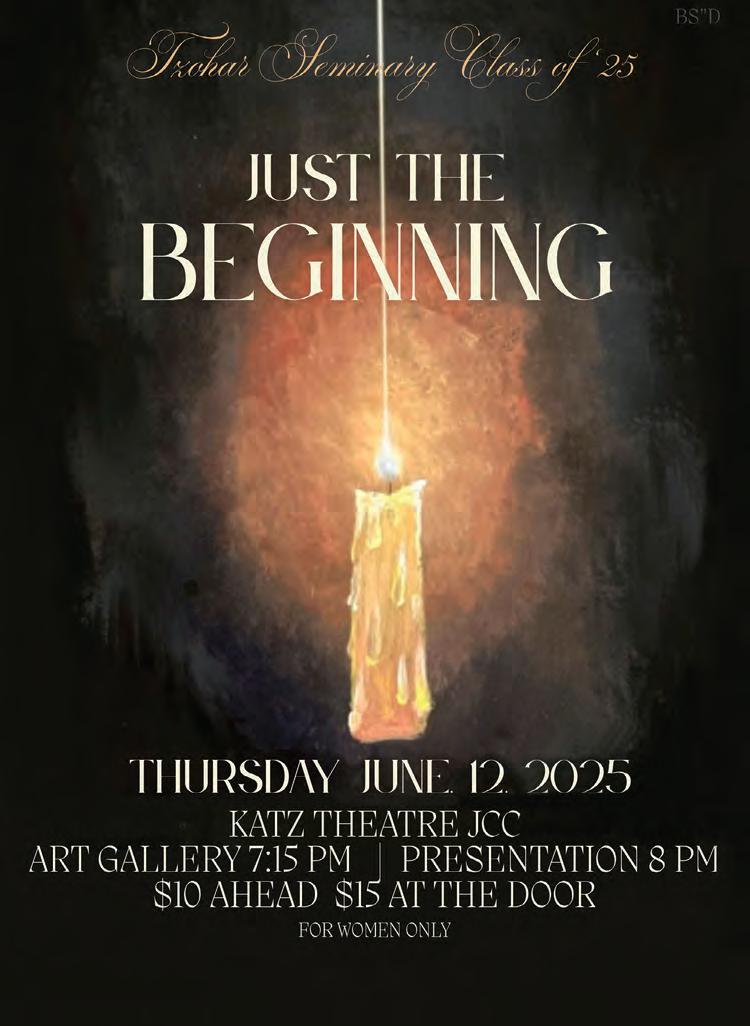
starting out or have years of experience, you are sure to enjoy the camaraderie and good times as you make new friends or cherish moments with long-term pals. All are welcome. Winners will be awarded Giant Eagle gift cards. All players should have their own mahjong cards. Contact Susan Cohen at susan_k_cohen@yahoo.com if you have questions. $5. templesinaipgh.org.
WEDNESDAYS, JUNE 11–JULY 29
Temple Sinai’s Rabbi Daniel Fellman presents a weekly Parshat/Torahportionclass on site and online. Call 412-421-9715 for more information and the Zoom link.
Bring the parashah alive and make it personally relevant and meaningful with Rabbi Mark Goodman in this weekly ParashahDiscussion: Life & Text. 12:15 p.m. For more information, visit bethshalompgh.org/life-text.
Join the Holocaust Center of Pittsburgh for a screening of “Perseverance: One Holocaust Survivor’s Story,” the newest edition in PA Cyber’s Emmy-nominated Moments in History series, that tells the story of local Holocaust survivor Melvin Goldman. The screening will be followed by a conversation between Goldman’s daughter and
Do you have a tried-and-true dish that comes with an interesting origin story? If so, we want to hear from you!
Submit recipes along with their backstories to newsdesk@pittsburghjewishchronicle. org, and write “Recipe” in the subject line. Please include a photo of the dish. You may see your submission as part of our column “Savoring Stories”! PJC
The Pittsburgh Jewish Chronicle invites you to join the Chronicle Book Club for its June 29 discussion of “My Father’s Paradise: A Son’s Search for His Family’s Past,” by Ariel Sabar. This 2008 National Book Critics Circle Award Winner was described by the Los Angeles Times as “a biography, a memoir, a meticulously reconstructed history of a largely vanished people and place. ... Transcending mere reportage, it acquires a novel-like warp and weft.” A compelling read, this book chronicles the author’s journey to understand his father’s KurdishJewish heritage in Iraq, where an ancient Aramaic-speaking community once thrived.
Your hosts
Toby Tabachnick, Chronicle editor
David Rullo, Chronicle senior staff writer
How it works
We will meet on Zoom on Sunday, June 29, at 1 p.m.
What to do
Buy: “My Father’s Paradise.” It is available from online retailers, including Amazon and Barnes & Noble. It is also available through the Carnegie Library system.
filmmaker Scot Rutledge. 6:30 p.m. Chatham University’s Eddy Theatre, 1157 Murray Hill Ave. eventbrite.com/e/perseverance-screeningregistration-1325346610389?u.
WEDNESDAY, JUNE 18
JFCS Pittsburgh presents From Stigma to Strength: Understanding Mental Health History and Managing Anxiety, exploring the evolution of mental health understanding and providing practical tools for today’s challenges and present evidence-based strategies for maintaining wellbeing. Virtual lecture and participation is free. 6 p.m. jfcspgh.org/CounselingRegistration.
FRIDAY, JUNE 20
Zionist Shabbat is a pre-Shabbat soiree with the goal of bringing together Pittsburgh’s young adult (aged 22-44) community to celebrate our shared love and support for Israel. Israeli hors d’oeuvres and wine will be served. Joined by Amy Albertson, a social media star and Israel and Jewish advocate who excels in speaking about Israel, Jewish pride and combatting antisemitism. $18. 6 p.m. Jewish Community Center of Pittsburgh, 5738 Forbes Ave. jewishpgh.org/event/zionist-shabbat. PJC

Email: Contact us at drullo@pittsburgh jewishchronicle.org, and write “Chronicle Book Club” in the subject line. We will send you a Zoom link for the discussion meeting.
Happy reading! PJC
— Toby Tabachnick


By Toby Tabachnick | Editor
Aresident of Elizabeth, Pennsylvania, is facing federal charges for making antisemitic threats to injure a local public official, according to Acting United States Attorney Troy Rivetti.
Edward Arthur Owens Jr., 29, was arrested last week by FBI agents. Owens is accused of knowingly and willfully transmitting the following threat against a public official via a social media app, according to the criminal complaint: “We’re coming for you [emoji of person raising right hand] [German flag emoji] be afraid. Go back to Israel or better yet, exterminate yourself and save us the trouble. 109 countries for a reason. We will not stop until your kind is nonexistent.”
The reference to “109 countries” is an antisemitic assertion that Jews have been expelled from 109 different countries and is “used by antisemites to call for the expulsion of Jews from other countries and otherwise to promote hatred,” Department of Justice officials said in a news release.
Prosecutors have filed a request for the Owens’ detention pending trial, saying that

he is a danger to the community. A hearing on the government’s motion was scheduled for June 5.
The public official who was the subject of the threats spoke with the Chronicle. For security reasons, they will not be identified by name.
They said that receiving the threatening

The driver of a tan Dodge Durango, who distributed more than 110 antisemitic and racist flyers throughout Squirrel Hill and Peters Township on May 18, was cited for littering, according to Shawn Brokos, director of community security for the Jewish Federation of Greater Pittsburgh.
He faces more than100 counts — one count for each bag thrown and recovered — and a fine of close to $50k.
The suspect was identified as Jeremy Brokaw of Zaneseville, Ohio.
The flyers, attributed to the Goyim Defense League, were enclosed in plastic bags weighted down with corn kernels.
The GDL “is a loose network of individuals connected by their virulent antisemitism,”
according to the Anti-Defamation League.
“The group includes five or six primary organizers/public figures, dozens of supporters and thousands of online followers.”
The propaganda on the flyers was titled “The Protocols of the Learned Elders of Zion: The Jew’s Plan for World Domination” and “Every single aspect of the Jewish Talmud is Satanic.”
Witnesses reported seeing people in a tan Dodge Durango with their windows open yelling, “Oy vey,” and throwing the bags, Brokos told the Chronicle shortly after the incident.
Several community members immediately reported the flyers to Federation via its Incident Report Form and included photos of the suspect vehicle. Those photos were shared by Federation with law enforcement, enabling them to catch the vehicle on License Plate Recognition cameras. PJC
— Toby Tabachnick
message was particularly disturbing following the murder of two Israeli Embassy employees in Washington, D.C., when a gunman randomly shot people outside an American Jewish Committee event.
“I’m worried for my safety and for my family’s safety, and worried for people who work in this office,” the official said.
“It’s hard to know how these people will act, because on many levels, they’re totally irrational,” the official continued. “It is irrational to send a message like that to someone you’ve never met. It’s irrational to feel this way about anyone.”
The official stressed that a shift is needed in public discourse.
“Public discourse needs to change, because threats of violence are not acceptable in our society,” the official said. “Who wants to live in a country where people want to execute each other? And it’s happening, like at that AJC event — the perpetrator wanted to kill Jews. And, you know, he was successful. Who wants to live in a society where that happens?”
The official urged “progressive champions on the left and conservative champions on the right who can impact public thought on these topics” to use their voices to condemn acts of hate-fueled violence.
“If you are in a progressive echo chamber, or you are in a conservative echo chamber, and you don’t stand up against threats of violence against anybody — but this is clearly targeted to Jews — how do you look at yourself in the mirror?” PJC
Toby Tabachnick can be reached at ttabachnick@pittsburghjewishchronicle.org.
WHEREAS, Eileen Finestone has been a most loyal, member of Ladies Hospital Aid Society (LHAS) of Western Pennsylvania since 1955; WHEREAS, Eileen Finestone served as the 21st President of LHAS from 1976-1978; WHEREAS, Eileen Finestone dedicated herself to a life of volunteerism in our community;
in 1899, to establish the Hebrew Ladies Hospital Aid Society. The charter’s mission was “to assist and provide the sick, injured, and disabled with proper medical and surgical attention and hospital treatment.” In a few short years,
The tradition of bridging and adapting to the healthcare needs of the community continues with this year’s gala, which supports The UPMC Bridge Clinic at the Center for Opioid Recovery Led by Jane Liebschutz, MD, MPH, FACP, Division Chief of General Internal Medicine at the University of Pittsburgh, a pioneer working to solve opioid and substance abuse disorders, The Bridge Clinic will serve as a clinical hub and referral system within UPMC and partner community programs and organizations dedicated to LHAS’ original mission. With an eventual permanent home at UPMC Mercy, patients will receive personalized medical services, follow-up care and transitioned support.
THEREFORE, so we, the Board of Directors of LHAS convey this memorial tribute, with love and sorrow, to her family and friends; Our heartfelt sympathy is extended to her beloved family whose loss we share. She will sorely be missed. May the name of Eileen Finestone be forever as a blessing.
WHEREAS, Ruth Spindell Rubenstein has been a most loyal, member of Ladies Hospital Aid Society (LHAS) of Western Pennsylvania since 1960; WHEREAS, Ruth Spindell Rubenstein served as a Board Member of LHAS from 2005-2025;
WHEREAS, Ruth Spindell Rubenstein dedicated herself to a life of volunteerism in our community;


THEREFORE, so we, the Board of Directors of LHAS convey this memorial tribute, with love and sorrow, to her family and friends; Our heartfelt sympathy is extended to her beloved family whose loss we share. She will sorely be missed. May the name of Ruth Spindell Rubenstein be forever as a blessing.



By Joshua Marks | JNS
Mohamed Sabry Soliman, a 45-year-old Egyptian national, has been charged with a federal hate crime and multiple state offenses after attacking a pro-Israel rally in Boulder, Colorado, with fire bombs and a makeshift flamethrower on Sunday, according to reports.
The Boulder attack occurred just 11 days after the fatal May 21 shooting of two Israeli Embassy staffers outside the Capital Jewish Museum in Washington, D.C., further intensifying concerns over escalating antisemitic violence in the United States.
The assault on Sunday wounded 15 individuals, including an 88-year-old Holocaust survivor, Boulder Police said during a Monday press briefing.
The incident occurred during a weekly event organized by “Run for Their Lives,” a group advocating for the release of hostages held by the Hamas terrorist group in Gaza since the Oct. 7, 2023, attack on southern Israel. Participants were marching through the Pearl Street Mall when Soliman, reportedly disguised as a gardener, approached and hurled incendiary devices into the crowd while shouting “Free Palestine” and other anti-Israel slogans, according to a Boulder Police affidavit.
Court filings indicate Soliman told investigators he had been planning the attack for over a year, initially intending to carry out a mass shooting. However, after being denied a firearm purchase due to his immigration status, he resorted to constructing fire bombs using gasoline and glass bottles. Authorities recovered 16 unused incendiary devices at the scene.
Soliman told investigators he intended to “kill all Zionist people” but delayed executing the attack until after his daughter’s high

school graduation, as documented in State of Colorado v. Soliman.
Soliman entered the United States on a B-2 tourist visa in August 2022, which expired in February 2023. He applied for asylum the following month but has been residing in the country illegally since his work permit expired in March 2025.
A police affidavit supporting Soliman’s arrest stated that he was born in Egypt, spent 17 years living in Kuwait and moved to Colorado Springs three years ago. He currently resides there with his wife and five children, about 100 miles south of Boulder.
U.S. Attorney General Pam Bondi described the fire-bombing as an “antisemitic terror attack.”
“In light of yesterday’s horrific attack, all terrorists, their family members, and terrorist sympathizers here on a visa should know that under the Trump administration we will find
you, revoke your visa, and deport you,” U.S. Secretary of State Marco Rubio wrote on X.
Israeli President Isaac Herzog also condemned the attack in a statement posted to X on Monday:
“The terror attack on members of the Boulder, Colorado Jewish community demonstrating for the release of our hostages is sickening and outrageous. I spoke earlier with Renee Rockford, President & CEO of the Jewish Federation, and expressed outrage and deep solidarity on behalf of the people of Israel with the Jewish community of Boulder, and my prayer for the recovery and healing of the wounded,” wrote Herzog.
“This vile act of terror is a painful reminder that antisemitism knows no borders. But let me be clear: we will never let terror win. The American and Israeli peoples stand united — determined to bring all our hostages home and to ensure no Jew, anywhere, stands alone,” he continued.
“To the wounded and the entire community: you are in our hearts. Am Yisrael Chai.”
In response to the Boulder and Washington attacks, White House Press Secretary Karoline Leavitt said in a message to Jewish Americans, “This President has your back, and he’s not going to allow anyone to take part in violent terrorism — it’s acts of terrorism — in our country.”
Soliman faces 16 counts of attempted first-degree murder, eight counts of first-degree assault and one federal hate crime charge. If convicted, Soliman could face up to 384 years for the attempted murder charges alone, with additional penalties possible for the assault and hate crime counts, including a potential life sentence under federal law, per information from U.S. Immigration and Customs Enforcement. The attack has drawn condemnation from political leaders across the spectrum. U.S. President Donald Trump stated on Truth Social that such assaults “WILL NOT BE TOLERATED in the United States of America,” attributing the incident to lax immigration policies and vowing to enforce stricter border controls.
Colorado Gov. Jared Polis condemned the attack, calling it “unacceptable” and stating that “hate has no place in our Colorado for anyone.” Federal authorities are treating the attack as a targeted act of terrorism driven by ideological hatred. At a Monday press conference, FBI and local officials stated that Soliman had not been on law enforcement’s radar prior to the incident and is believed to have acted alone.
The victims, ranging in age from 52 to 88, suffered varying degrees of burn injuries. As of Monday, two individuals remained hospitalized, one of them in critical condition, hospital officials reported.
Soliman is currently being held on a $10 million bond and is scheduled to appear in court on Thursday, according to Boulder County Jail records. PJC
More organizations are fighting surging antisemitism. But how many do we need?
By Zev Stub | The Times of Israel
Yaron Lischinsky, a research assistant in the Israel embassy’s political section, and partner Sarah Lynn Milgrim, a member of the embassy’s administrative staff, were shot and killed on May 21 as they left an annual event for young Jewish diplomats at the Capital Jewish Museum in Washington, D.C. Elias Rodriguez, the man charged with the double homicide, approached police on the scene after the shooting the young couple and told them, “I did it for Palestine, I did it for Gaza,” according to a court document.
While Rodriguez has not yet been tried, for Attorney General Pamela Bondi the murders were clearly a hate crime fueled by antisemitism: “This brutal, antisemitic violence has no place in our country or anywhere in civilization,” Bondi said.
In the wake of the shooting, among the statements of mourning and outrage, Jewish People Policy Institute president Yedidia Stern issued a call for the state of Israel to establish an authority to combat antisemitism.
However, his call, like others following similarly horrific incidents of global antisemitic violence, ignores the fact that such Israeli

government bodies already exist — alongside dozens more Jewish and governmental organizations earmarked for fighting antisemitism around the world.
Once a field of Jewish advocacy work dominated by a small number of large organizations — most notably the Anti-Defamation League — fighting antisemitism is now a complicated matrix of interest groups of different shapes and sizes, often with overlapping missions and contradictory messaging.
Last week, the Israeli Foreign Ministry
held an international conference on antisemitism alongside the International Holocaust Remembrance Alliance, with speakers and goals that at times seemed to be responding to — or competing with — the Diaspora Ministry’s controversial conference on antisemitism held two months earlier.
Recently, within the space of two weeks, hefty antisemitism reports were published by the ADL, Tel Aviv University, Israel’s Diaspora Ministry, StandWithUs and the Combat Antisemitism Movement, each with different data and sometimes contradictory
conclusions. These come in addition to countless other reports documenting the parabolic growth of antisemitic incidents throughout the world over the past 19 months of war in Gaza.
Sources within the Jewish world are concerned that contradictory messages from either side of the political spectrum drown each other out, limiting their effectiveness. There is also a wariness that some organizations may be more concerned with appearing busy for their donors than actually making an impact.
Others wonder if such a glut of agendadriven organizations is harmful for the Jewish cause.
“I am asked by many people, including some Jews, why we have so many different institutes and agencies to combat antisemitism,” said Alvin Rosenfeld, director of Indiana University’s Center for the Study of Contemporary Antisemitism. “There’s a sense that many of their efforts lack strategic purpose. Meanwhile, despite their work, antisemitism continues to rise, without any sign of slowing down.”
Add to that another complicating factor: The nature of antisemitism around the world has changed since Oct. 7, 2023, said Michal CotlerWunsh, Israel’s special envoy for combating antisemitism. However, many of the organizations dedicated to fighting antisemitism haven’t evolved to reflect the new reality.
DSA condemns Capital Jewish Museum shooting after one of its factions praises the attack
The Democratic Socialists of America condemned the murders of two Israeli embassy employees outside a Jewish museum last week, after one of the far-left party’s factions praised the attack, JTA reported.
“Democratic Socialists of America seek to democratically transform our society and reject vigilante violence,” read the statement, posted to X last week. “We condemn the murder of Israeli embassy workers. Any statement otherwise is not the stance of DSA.”
The condemnation — published nearly a week after Sarah Milgrim and Yaron Lischinsky were gunned down outside an event hosted by the American Jewish Committee at the Capital Jewish Museum — appears to refer to a post by one of the DSA’s factions, called the Liberation Caucus, endorsing the attack. That faction, which calls itself the DSA’s “MarxistLeninist-Maoist caucus,” reposted a statement praising the shooting and called to “Free Elias Rodriguez,” the alleged gunman.
“As imperialism has made the entire world its battlefield, it is justified to fight it, by any means necessary, without regard for geography,” the statement said. “This holds especially true for those of us struggling behind enemy lines, inside the US, an entity that is an equal party in all crimes committed by the zionists.”
Following the Liberation Caucus tweet, New York Rep. Ritchie Torres, a Democratic pro-Israel stalwart, tweeted, “The Democratic Socialists of America (DSA) has publicly endorsed the barbaric murder of a young Jewish and Israeli couple.” He does not appear to have reacted to the subsequent condemnation by the DSA.
The clash between the DSA and its Liberation Caucus reflects a broader split on the American far left over whether to praise or condemn the diplomats’ murders. The suspect, Rodriguez, is a far-left activist who allegedly shouted “Free Palestine” following the attack.
Israeli baby born after pregnant mother was killed in terror attack dies of his wounds
Last month, an Israeli pregnant woman who was en route to deliver her baby was killed in a shooting attack in the West Bank, JTA reported.
Last week, two weeks after the shooting, doctors communicated that that baby had died of his wounds.
In the terror attack, near the Israeli settlement of Bruchin in the northern West Bank, a shooter fired at passing cars and killed Tzeela Gez, a Bruchin resident who was on the way to the hospital with her husband to deliver their fourth child. She was rushed to the hospital, where doctors delivered the baby and then fought to save his life.
The baby was named Ravid Haim, in accordance with his mother’s wishes. Ravid Haim reportedly received his name before his brit
June 9, 1967 — Troops move into Syrian Golan
After an aerial assault, Israeli troops launch a high-casualty ground offensive into the Syriancontrolled Golan Heights on the Six-Day War’s fifth day and gain control of the mountains before a cease-fire.
milah, or ritual circumcision, and while still under emergency care, so that people could pray for his recovery.
Michigan man who threatened parents and preschoolers at a synagogue pleads guilty to weapons offense
A Michigan man who allegedly yelled antisemitic threats at families entering a synagogue in 2022 pleaded guilty last week to the charge of being a felon in possession of a firearm, according to the Department of Justice, JTA reported.
In December 2022, Hassan Chokr, 37, of Dearborn, Michigan, drove through the parking lot of Temple Beth El in the Detroit suburb of Bloomfield Hills as parents walked their preschoolers into the building, and yelled a series of antisemitic threats at them, according to federal prosecutors.
After he was asked to leave, Chokr — who had a prior felony conviction for a different offense in 2017 — went to a gun store in Dearborn where he attempted to purchase three guns: a shotgun, a rifle and a semi-automatic pistol. He lied about his criminal record, according to prosecutors.
While waiting for his background check, Chokr said that he would “even the score” and use the guns for “God’s wrath,” according to prosecutors. He was denied the purchase following the results of the background check, but was charged for possessing multiple firearms within the store during the attempted transaction.
Chokr faces up to 15 years in prison and is scheduled to be sentenced in federal court on Sept. 24.
Official who posted antisemitic rhetoric becomes Pentagon press secretary
Kingsley Wilson, a Department of Defense official who has repeatedly echoed antisemitic rhetoric online, will serve as the Pentagon’s new press secretary, JTA reported.
“Kingsley’s leadership has been integral to the DoD’s success & we look forward to her continued service to President Trump!,” said Sean Parnell, the chief Pentagon spokesman and a senior advisor to Defense Secretary Pete Hegseth, in a post on X.
Wilson was appointed in January as deputy press secretary at the Pentagon and faced backlash from the Anti-Defamation League as well as several senators for a history of promoting antisemitic conspiracy theories. Last year, Wilson tweeted a neo-Nazi talking point about Jewish lynching victim Leo Frank, whose murder spurred the ADL’s creation.
She has also tweeted several times in support of the “Great Replacement” theory, whose original version contends that Jews are orchestrating the replacement of majority-white nations with immigrants of color.
The Jewish Democratic Council of America condemned the appointment on social media, writing, “This administration is infested with antisemitism.” PJC
—
Compiled
by
Toby Tabachnick


June 6, 1956 — Merger forms Tel Aviv University
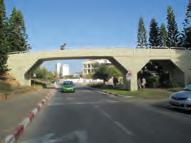
The Tel Aviv School of Law and Economics merges with the Municipal Institute of Natural Sciences and Humanities to form Tel Aviv University, which soon adds the Academic Institute of Jewish Studies.
June 7, 1981 — Israel destroys Iraqi reactor
Eight Israeli F-16s fly a 2,000-mile round trip to bomb Iraq’s Osirak nuclear reactor. Operation Opera destroys the nearly complete French-built reactor, which Israel fears is meant to develop weapons.
June 8, 1898 — Zionist Orthodox Union is founded
The Orthodox Union forms in New York as an organization for traditional Jewish congregations in the United States. At its start, it declares that “restoration to Zion is the legitimate aspiration of scattered Israel.”
June 10, 1930 — Arab leaders admit failure of not cooperating Frederick Kisch, the head of the Jewish Agency’s political department, records in his diary that almost all Arab leaders acknowledge they failed by refusing to participate in British talks about Palestine’s future.

June 11, 1947 — Hadassah co-founder Emma Gottheil dies Emma Gottheil, one of the earliest female Zionist leaders, dies in New York at age 85. She was a delegate to the Second Zionist Congress, and she helped found the group that became Hadassah.
June 12, 1948 — Jews in Tripoli face riots
A mob attacks the Jewish Quarter in Tripoli, Libya, while North African Arabs are passing through on their way to fight against Israel’s independence. In the resulting two days of riots, 14 Jews are killed. PJC

Shapiro:
Continued from page 1
unfortunately, it seems that hatred and antisemitism are on the rise. I know the attack in Washington, D.C. that led to the murder of the young couple who worked for the Israeli Embassy, Yaron and Sarah, is on our minds and is a call from all of us.”
Pittsburgh, she said, “is unfortunately too familiar with acts of violence fueled by hate. After the deadliest attack of antisemitism in our nation’s history, this community grieved and mourned, to be sure, but what inspired me is how everyone came together and made it clear that you are stronger than the forces of hate, and you will continue to proudly celebrate our Jewish identity.”
Recognizing that Jews are feeling “vulnerable and overwhelmed,” and that some may be inclined to “retreat and put our heads down,” she encouraged the community to take the opposite approach.
“I think the best way to stand against the forces of hate is to stand proudly, proud of who we are,” she said. “Reach out to others. Instead of focusing on our vulnerabilities, focus on our strengths. This community has
Unification:
Continued from page 1
to approve the resolution recommending the unification, 17 members of the board voted yes, two no and one person abstained.
Another Temple Sinai board member said they weren’t opposed to the unification but felt that other alternatives weren’t explored and that questions remained unanswered.
“I feel like a lot of assumptions have been made and we haven’t really done due diligence,” they said.
And they are concerned about moving the congregation to Rodef Shalom’s building, which is in Shadyside.
“As a board member, as a community member, it’s very much about location. It’s about what does it mean to have the only Reform synagogue in the city of Pittsburgh leaving Squirrel Hill, which is, in my mind, the center of Jewish life in Pittsburgh, especially with the rise of antisemitism around the world, in our country and in our city.”
Unification, they said, doesn’t have to mean merging the two congregation’s into one in Rodef Shalom’s building.
“There’s a lot of administration, a lot of business processes that could be combined. When we started this 18 months ago, they threw out a lot of different options around unification. It could mean we share a religious school or administrative staff. It could mean we completely unify. I don’t know that we’ve investigated any of those other options.
“I’m just not sure this is the right plan,” they said.
A former Temple Sinai board member said a merger would mean fewer options.
“They’re taking away choices. When you only have one Reform congregation, it’s that or potentially nothing, right? It’s going to drive people like me to not affiliate.”
Rodef Shalom’s building, they noted, has issues that conflict with what they understand to be longstanding ethical standards of Temple Sinai.
demonstrated strength and resilience and is an example to others.”
Shapiro noted she is an honorary member of the board of directors of The Tree of Life “to help rebuild, remember, fight antisemitism and bring people together to push back against hate in all its forms.”
drive us to serve others,” Shapiro said. “Our service is rooted in the tradition of tikkun olam, as I know yours is too.”
Shapiro’s address was followed by a conversation with Cynthia Shapira, chair of the Pennsylvania State System of Higher Education’s Board of Governors, and a
“I want you to know that our faith and commitment to the work we do has only been strengthened by this attack, and we will not be deterred from living our faith proudly.”
–LORI SHAPIRO
The first lady has an obvious fondness for Pittsburgh. She recalled the Jewish community here warmly welcoming her two oldest children to holiday celebrations when they were students at the University of Pittsburgh.
“Though we come from different sides of the commonwealth, I really feel at home here, and I think that’s in part because we are all committed to the same Jewish values that
trustee of JWF. Shapira began the conversation by asking Shapiro about some of the biggest joys she’s had as first lady.
“I am really out in the community every day, meeting with people who are doing amazing, amazing things,” Shapiro responded. “And it has just sort of reaffirmed my belief in humanity. There’s so many good people doing so many good things every

They claimed the bimah isn’t fully accessible, saying, “accessibility and inclusivity is one of the tenets of Sinai.”
Other members of Temple Sinai said they are concerned about giving up their building and combining two synagogue cultures that might not entwine easily.
One Temple Sinai member, who formerly was affiliated with Tree of Life when it merged with Or L’Simcha, said that experience makes them wary about this potential unification.
“We had very different cultures, very different styles, and we kind of got forced into being together which didn’t work out so great,” they said.
“The two shuls are very different. It doesn’t feel like that’s being addressed, at all.”
When Deb Polk first learned of the unification talks and Temple Sinai’s hunt for volunteers, she offered to help. She ultimately chaired the Governance Committee created to help explore the unification.
Unification, she said, makes sense to her.
“The analogy I have in mind is that it’s
day. And I think we get so overwhelmed by the barrage of news, and there are a lot of challenges right now and a lot of difficult things. If we just take a look around in our communities, there’s so much good out there.”
It was clear that much of that good is being accomplished by several of the JWF’s grantees. Representatives from Casa San José, Jews for a Secular Democracy, Ruling Our Experiences and the Jewish Community Center of Greater Pittsburgh joined a panel discussion explaining the projects funded by the JWF.
JWF, based on a collaborative philanthropy model, was founded in 2000 and began making grants in 2003. It was created specifically to address the needs of women and girls in both the Jewish and general communities. At least 50% of JWF funds each year are invested into the Jewish community.
Since JWF’s founding, 188 women have become trustees and the organization has to date awarded more than $2 million in grants. This year, JWF grants totaled $170,050. PJC
Toby Tabachnick can be reached at ttabachnick@pittsburghjewishchronicle.org.
“The more people think about it and the more they talk about it in our different congregations, the more it’s not just that we’re comfortable, it’s that we really like the idea,” he said.
He said the worry over a culture clash has been overblown.
“It’s easy for me to talk with people at Temple Sinai because they are our friends. They’re our neighbors. Our kids have grown up together,” he said.
Both congregations, he said, strove to be transparent and to provide all the information required to make a thoughtful decision.
“The amount of diligence that has gone on with the steering committee, the communication, particularly that the presidents have had with their boards — there has been a tremendous amount of study from the beginning,” he said.
Schaffer said that was purposeful.
“You can’t make a decision based on emotion if you’re going to make an intelligent decision,” he said.
like when you have a big university, you have resources to do a lot of things you wouldn’t necessarily be able to do at a tiny, small college,” she said. “We can be more efficient and have resources left over to do things we haven’t even imagined yet.”
Polk said she doesn’t see an issue arising from the two congregations’ cultures.
“We’re all Reform Jews who have chosen to affiliate and our congregations are within a mile of each other,” she said. “These are city congregations. My guess is that we have more in common than we have that’s different.”
As for the availability of information, Polk said, the board was transparent.
“We were getting emails and if someone wanted information, I don’t think there was ever an effort to withhold information,” she said.
Like Polk, Eric Schaffer volunteered to help examine the possible unification. The Rodef Shalom member served on the steering committee that helped lead talks between the two congregations. It’s no surprise that he’s a proponent of the unification.
Fellow Rodef Shalom member Sharon Werner led the legal committee examining a possible unification.
She said she is excited about the possibility of unifying.
“Especially having kids who are at the age of beginning religious school. The idea of combining with another synagogue and making the class size even bigger would be more exciting for kids. I think it adds an extra layer to their Jewish education,” she said.
B oth congregations, she said, have held “countless” town hall meetings to address concerns.
The unification, she said, will most likely experience bumps in the road and won’t be perfect for everyone but, she said, “this is, for sure, the right move.”
Rodef Shalom and Temple Sinai are holding separate meetings on June 8 to approve, or not, the possible unification. PJC
David Rullo can be reached at drullo@ pittsburghjewishchronicle.org.
Tree:
Continued from page 2
Center distributed a tree to Community Day School last year.
Speaking at the Squirrel Hill-based ceremony, former Head of School Avi Baran Munro told students, “God willing, this tree will last hundreds of years and, God willing, the teachings you’ve learned here will last hundreds of years,” TribLive reported.
The tree at Seton Hill will serve a similar purpose, according to James Paharic, director of the university’s National Catholic Center for Holocaust Education.
“It’s a way to help us in our mission to help young people to learn about the Holocaust
Continued from page 8
While security officials talk about Israel fighting a war on seven fronts (Iran, Gaza, Lebanon, Yemen, Syria, Iraq and the West Bank), “We need to recognize that antisemitism is the eighth front, and approach it strategically as any other front,” CotlerWunsh told the Times of Israel. “If someone is still defending Israel the same way they were before the atrocities of Oct. 7, they don’t understand the shift that has taken place.”
C otler-Wunsh was appointed as Israel’s antisemitism envoy by the Foreign Ministry in September 2023, just three weeks before Hamas launched its ongoing war against Israel. Already at that point, she had the goal of formulating a comprehensive battle plan to fight antisemitism around the globe. That would include mapping out the existing organizations and their initiatives, and deploying them to maximize impact and minimize overlap.
That never happened, as the war threw everything into disarray, although Cotler-Wunsh continues to call for Jewish organizations to put together a unified front. Meanwhile, the number of entities around the world dedicated to fighting antisemitism has never been as large, or, some would say, as discombobulated.
A new type of fight
It’s not hard to understand why so many organizations fighting antisemitism have popped up in recent years, said Abe Foxman, former national director of the ADL.
Jews are seeking safety and security at a time when antisemitism, whether expressed as online harassment or as physical attacks on Jews and Jewish institutions, is skyrocketing worldwide. A record 9,354 antisemitic cases of harassment, vandalism and assault were recorded in the U.S. in 2024, translating to more than one every hour, the ADL recently reported. Jewish communities in France, the United Kingdom, Australia, South Africa and other countries have reported similar rises.
“We live in a democracy, and no one can prevent anyone from starting an organization,” Foxman said. “There is more
m

to the problem, focusing on education, legal advocacy, community building, allyship with other minorities and other aspects.
Rising hatred is driving a hunger for new approaches. Fifteen years ago, when Rosenfeld opened his institute for the study of antisemitism at Indiana University, there was only one other such program in the U.S., at Yale University, he said. “Since Oct. 7, there is a lot of ambitious fundraising for similar programs at other universities,” he noted.
Generally speaking, Foxman said, there are four main organizations leading the battle against antisemitism in the U.S. — the ADL, the AJC, the Conference of Presidents of Major Jewish Organizations and the Jewish Federations of North America, in addition to many newer “single issue” organizations established in recent years as a response to rising antisemitism. In many other countries, there are organizations representing the local Jewish community’s needs.
Meanwhile, a plethora of smaller organizations have sprung up, not all with clear or achievable goals. Some operate primarily in the social media space, or target specific niches that they believe are underserved.
Rosenfeld mentioned a number of smaller organizations that he felt were doing particularly good work on U.S. college campuses, including the Amcha Initiative, the Brandeis Center and the Academic Engagement Network. He also noted the Combat Antisemitism Movement‘s worldwide efforts to tackle projects that other organizations aren’t, such as working with mayors of different cities to fight hatred in urban centers.
None of the sources The Times of Israel spoke with were willing to call out any individual organizations for being particularly ineffective. One thing they all agreed on, though, was that we don’t need more work gathering and describing the data.
“How many reports do we need to describe how bad things are getting?” Foxman shrugged.
In addition to the trauma of exploding antisemitism, Foxman said, one reason many new organizations have sprung up is that isfaction with the way that the established legacy Jewish organizations have handled the attack’s aftermath.
During the past 60 years, organizations like the ADL have primarily fought antisemitism using a strategy of containment, Foxman said. “There was an understanding that antisemitism cannot be eliminated, but we could take steps to contain it and make sure it didn’t have negative consequences.”
During the 1980s, when Foxman took the helm of the ADL, the landscape of Jewish organizations in the U.S. was much simpler, a nd American Jews enjoyed almost unprecedented acceptance in larger society, he said.
“In my early days, even if we didn’t like the other organizations, because we were fighting for the same dollars from donors, we would still work together,” Foxman said. “There were fewer than a dozen significant organizations, and we had a sort of unofficial separation of jobs. We all had our expertise, and we all worked together when an issue presented itself, like the plights of Soviet Jewry or Ethiopian Jewry.”
That model worked well at the time, Foxman said. “We did a pretty good job of breaking down barriers that Jews faced in many areas of life, from cultural acceptance to success in political, academic, and corporate life. The fact is that from the murder of Leo Frank in 1913 until the shooting at the Tree of Life Synagogue in Pittsburgh in 2018, only three Jews were killed in the United States because they were Jews. [Several more have been killed since then.] But the younger generation doesn’t appreciate that history.”
After Oct. 7, however, things have changed, and people demand new approaches, Foxman conceded.
“We didn’t fail. The world changed,” Foxman said. “The containment strategy assumed that we could use truth and civility to fight the big lies that caused hate and antisemitism. Now, however, answering lies with truth doesn’t work anymore, because the lies are a tsunami
and the dangers of antisemitism and extremism,” he told KDKA.
There’s an element of kismet to the tree’s placement, Seton Hill President Mary Finger noted.
“It is particularly fitting that this sapling — propagated from the chestnut that gave Anne Frank hope in her darkest days — is being planted along this road that connects the Seton Hill University campus with the campus of the Sisters of Charity,” Finger said in a statement. “We believe it will serve as a reflective space where people can come to think, to dream and to hope.”
PJC
Adam Reinherz can be reached at areinherz@pittsburghjewishchronicle.org.
spread everywhere over the internet. When the respect for truth is destroyed, education is no longer an effective tool to fight the lies.”
Increasing divisions along political lines make it more challenging than ever to educate against hatred and ignorance, Foxman said.
“There is no more bipartisanship,” said Foxman, who handed over the reins of the ADL to its current CEO, Jonathan Greenblatt, in 2015. “There’s an ongoing war between Jews on the right, including those supporting [President Donald] Trump, and those on the progressive left, and they are very distant from each other on Jewish issues, speaking different languages. It’s tragic how large the differences have become, and that makes leadership that much more difficult. There’s an urgent need for the community to come together — first to provide immediate security and then to contain disinformation, conspiracy theories and lies on the internet.”
Foxman stressed the importance of defining goals in fighting antisemitism, and expressed discomfort with certain initiatives that, he said, could set back the acceptance of Jews into broader American society. He cited the ADL’s “report card” of antisemitism on U.S. college campuses as an example.
“We worked for 50 years to get Jewish kids into the Ivy Leagues because, like them or not, they open doors for greater success,” he said. “If you start giving Columbia University and Harvard Ds and Fs — do we want to give the message that Jews shouldn’t go there?”
Foxman added that a future-looking strategy should include more focus on outreach to U.S. Latino and Hispanic communities.
“A lot of our future success depends on building relationships with them,” he said. “We need a strategy for that.”
Cotler-Wunsh, like Foxman, believes it is key for organizations to cooperate on a comprehensive strategy that would define clear goals and streamline efforts.
“We need an international platform for a comprehensive strategy in addition to national strategies,” she said. “This isn’t something any single organization can tackle alone. The state of Israel is ready to take the lead in creating a plan. We just need to get everyone on board.”
PJC
Sign up on the right hand side of our homepage. pittsburghjewishchronicle.org
THE BEST OF THE h IN YOUR EMAIL FIVE TIMES A WEEK. Sign up on the right hand side of our homepage. pittsburghjewishchronicle.org THE BEST OF THE h IN YOUR EMAIL FIVE TIMES A WEEK. Sign up on the right hand side of our homepage. pittsburghjewishchronicle.org THE BEST OF THE h IN YOUR EMAIL FIVE TIMES A WEEK.
this what it is
We are horrified, but sadly not surprised, that a man who said he wanted to “kill all Zionist people” threw two incendiary devices into a group of Jews who were peacefully gathering in Boulder, Colorado, in support of the hostages still held by the terrorist group Hamas in Gaza.
As the man attempted to kill as many Jews as he could, he yelled “Free Palestine.”
That’s the same phrase shouted by the man who killed Sarah Milgrim and Yaron Lischinsky two weeks ago as they exited the Capital Jewish Museum in Washington, D.C.
And these terror attacks came just weeks after Pennsylvania Gov. Josh Shapiro’s residence was firebombed by a man who said he did it because of what the governor “wants to do to the Palestinian people.”
Make no mistake: A call to free Palestine “from the river to the sea” — i.e., rid the land of Jewish people — and that urges its followers to “globalize the intifada,” is a call to kill Jews.
As we’ve stressed many times in these pages, while it is not antisemitic to criticize
the actions of the Israeli government, it is antisemitic to hold all Jews responsible for those actions. And it is antisemitic to deny the Jewish people a right to self-determination in their ancestral homeland.
Jews have been verbally harassed in the streets. Jewish university students have been physically assaulted.
These attacks and threats did not arise in a vacuum, but rather can be linked to the reck-
As the man attempted to kill as many Jews as he could, he yelled “Free Palestine.”
Pittsburgh, the site of the most violent antisemitic attack in the history of the United States — perpetrated by a white supremacist — tragically also has its share of Jew hatred coming from the “Free Palestine” movement. Mohamad Hamad, a former member of the Pennsylvania National Guard, who identifies as a “Hamas operative,” and Micaiah Collins, the child of a local Presbyterian pastor and a vocal anti-Israel activist — are awaiting trial on charges that include building bombs with the intent to detonate them.
Jewish buildings here have been defaced.
less and violent rhetoric spewed by Jew haters at campus protests and on Instagram, X and TikTok. They can be linked to the misinformation propagated on those sites and by some media outlets, and then amplified by influencers and politicians who lack moral clarity. They can be linked to the use of the term “Zionist” as a racist slur.
Just last week, a local public official was threatened on a social media app by a man in Elizabeth, Pennsylvania, who wrote: “We’re coming for you … Go back to Israel or better yet, exterminate yourself and save us the
trouble.” (See story on Page 7.) The message included Nazi imagery.
In an interview with the Chronicle, the local official targeted by the Elizabeth man urged “progressive champions on the left and conservative champions on the right who can impact public thought on these topics” to use their voices to condemn acts of hate-fueled violence.
We agree. The false accusations against Israel and the vilification of Jews has to stop. And those who refuse to stop must be called out for what they are: hateful antisemites.
We applaud elected leaders like Sens. John Fetterman and Dave McCormick, and Rep. Chris Deluzio, who immediately and unequivocally condemned the attack in Boulder and clearly labeled it as Jew hatred.
Others, like Rep. Summer Lee, could only manage a generic and pro forma post: “Violence has no place in our communities, and no one should live in fear.”
That is not a good enough. The violence in Boulder — in Washington, in Harrisburg, in Pittsburgh — was antisemitic.
If we want to stop it, we can’t be afraid to name it. PJC
For this I became a Jew? Yes, for exactly this I became a Jew.
Guest Columnist
Meg Keene

In keeping with Jewish tradition that makes no differentiation between those who are born Jews and those who become them, I rarely talk about being a convert. But in light of the antisemitic attacks in America over the last two weeks, and as we celebrated Shavuot, a holiday honoring a convert, I wanted to break that silence.
My beit din — the rabbinic court that signed off on my conversion — was exactly 16 years minus a month ago. I completed my conversion after four years of study — because I’m nothing if not both thoughtful and stubborn. Back in 2005 when I started the process, and in 2009 when I formally converted, the level of antisemitism we’re currently seeing was unimaginable in the modern world. We were at the end of what we now know was a golden age for Jews, and we thought that after the Holocaust, society knew better.
We were, of course, wrong.
But my conversion adviser was wise. He understood that as Jews, our primary law is
Guest Columnist
Mitchell Bard

Even among his most ardent Jewish supporters, President Donald Trump is becoming harder to defend. The man once hailed as the “most pro-Israel president in history” is now acting more like Joe Biden
pikuach nefesh — the protection of life. And when we accept a convert, we put their life and the lives of any of their decedents at risk. To do so is a serious thing, and can only be done if the convert has a Jewish soul, and hence there is no other option.
(The teaching is that all Jewish souls were present at Sinai, where we received Torah, which is what we celebrate on Shavuot. Most souls were born into Jewish families, but some of us were born into non-Jewish families, and part of our soul’s task was to find its way home.)
My conversion adviser was serious about me understanding the risk on a bone-deep level. He knew I wanted kids, and because of that, he wouldn’t consider my conversion until I had had nightmares about my future children and the Holocaust.
Every clergy member I’ve told this to since my conversion has said that was “over the top” and “too much.” But looking around the world today, I think it was exactly right. I don’t know a single Jewish mother that doesn’t have Holocaust nightmares about their children, particularly now. It’s rooted in our DNA. We gave birth to them, and we know the risk at a cellular level.
At my beit din, before announcing the decision, my conversion adviser said to me, “If we fill out this certificate, it will be on file.
with a MAGA hat. Trump’s betrayals of Israel — once unthinkable to his loyal base — are piling up, leaving some MAGA Jews struggling to justify their support.
Reports that Trump threatened to abandon Israel if it did not halt its war against Hamas (denied by the administration) should have sent shivers down the spine of every Israeli policymaker and American supporter.
Even the most stalwart defenders of Israel in the administration, U.S. Secretary of State Marco Rubio and U.S. Ambassador to
And if the Nazis come back, your name will forever be on record as a Jew. Are you sure you want to do this?” I said yes, because it was my soul’s only option.
But on that day, July 3, 2009, in San Francisco, that reality seemed far off, if not impossible. I told my husband’s family what had transpired at brunch after, and they laughed. “A dramatic question,” they said, “but not a real risk.”
But it turns out, the risk was all too real. Last month, when a young couple was killed after leaving an event at a Jewish museum, my 9-year-old daughter asked, “Why is tonight different than every other night they kill Jews?” She didn’t realize she was mirroring the Passover question. And the answer, of course, is that it wasn’t. All nights they kill Jews are like Shabbat Shachor, that Black Shabbat of Oct. 7. Yom Shachor. Laila Shachor. Black day. Black night.
After the attack in Boulder, my 12-year-old son just asked in a flat voice: “How many Jews were killed?” (The answer is none, but not for lack of trying, and the damage is severe.) But it horrifies me that at 12, this is the reality he lives in, the question he knows to ask.
As someone with a significant social media presence, every day since the Pittsburgh synagogue shooting in 2018, I’ve spoken out about rising antisemitism, tried to win the hearts
Israel Mike Huckabee, are being conscripted into pressure campaigns against Israel, forced to deliver ultimatums that would have once b een unthinkable under any Republican president.
Trump’s record of actions that would have earned him the label of “anti-Israel” if carried out by a Democrat is now undeniable:
• He forced Israel into ceasefires with both Hamas and Hezbollah.
• He has, like former President Biden, micromanaged aspects of Israel’s wars with
and minds of non-Jews. And I’ve been in the best company, Jews who have devoted much of their lives to the cause. But it has only gotten worse. Those of us who have been outspoken have been treated as Cassandras, disbelieved and mocked until it was too late. People’s careers have been damaged, lives put at risk. And yet the horrors only grow. It feels late in the day now. I have very little hope that we’ll convince non-Jews to care.
But when my friends say they’re hopeless, I note that there is hope if we look within. I have nothing but hope and faith in the Jewish people. We have each other, all of us: conservative and liberal, secular and religious, Israeli and in the Diaspora. And we love each other more than they can ever hate us.
Sixteen years ago I made the only choice available to me. I honored my Jewish soul. Even as we’ve walked into the fire, I’ve never regretted it. We are, in fact, the very best, and I love us more than anything. I’m lucky to be here. PJC
Meg Keene is a bestselling author and novelist. She founded the groundbreaking online publication A Practical Wedding. She currently resides in Northern California, with her husband and two kids. This article first appeared on JTA.
Hezbollah and Hamas, as when he warned Israel not to target infrastructure in Beirut and delay “Operation Gideon’s Chariots” in Gaza.
• He imposed a 17% tariff on Israeli imports, effectively punishing one of America’s closest allies.
• He eliminated USAID funding for Israel when he dismantled the agency.
• He legitimized negotiations with jihadist enemies of Israel and their supporters —
Last week, the Chronicle asked its readers in an online poll the following question: “Will you be participating in a learning event for Shavuot?” Of the 182 people who responded, 50% said no, 41% said yes and 9% said they weren’t sure. Comments were submitted by 25 people. A few follow.
The community-wide Tikkun Leil Shavuot provides a great opportunity to learn from new (to me) teachers. It’s a highlight of Jewish Pittsburgh.
We always go to services and then stay for the learning at our synagogue.
The annual event sponsored by the JCC and coordinated by the Jewish Federation of Greater Pittsburgh (Rabbi Danny Schiff) is an extraordinary show of Jewish unity around the thing that makes us uniquely Jewish, our Torah. This may be unique to our community and should be supported!
Continued from page 12
the ISIS leader of Syria, the Islamist president of Turkey, the Hamas-sponsoring Qatari emir, and the Iranian mullahs — while offering Israel nothing in return.
• He initiated direct talks with Hamas, reversing decades of bipartisan American policy that refused to legitimize the terror group.
Those negotiations led to the release of Israeli-American hostage Edan Alexander at the expense of other Israeli hostages, ending the siege on Gaza and allowing humanitarian aid that Israel says Hamas exploits. Initially framed as a goodwill gesture from Hamas to Trump, the truth emerged: The release was a political trade orchestrated by Trump without Israel’s consent.
Trump visited the Gulf states but skipped Israel. During the Mideast trip, he made deals without securing a single concession for Jerusalem. He dropped sanctions on Syria without any guarantees for Israeli security and forcing Israel to end most of its operations; made an unprecedented $142 billion arms
Will you be participating in a learning event for Shavuot?
sale to the Saudis without getting an agreement to normalize relations with Israel; and accepted the $400 million bribe (er, plane) from Qatar without the expulsion of Hamas representatives or a promise to end support for the terrorists.
Trump has also talked about providing the Saudis and UAE with F-35 stealth fighter planes that would violate the law and decades of policy guaranteeing Israel’s Qualitative Military Edge over the Arabs.
As apparent consolation for Trump’s snub, U.S. Vice President JD Vance was supposed to travel to Israel but backed out, citing “logistical reasons.” Reports indicated that the real reason was to avoid appearing to support Israel’s intensification of military operations in Gaza.
In a stunning betrayal, Trump told Israel not to attack Yemeni terrorists because the United States would “handle it,” only to cut a deal with the Houthis that did not require a halt to their missile attacks on Israel, which have since escalated.
Then came the withdrawal of U.S. troops from Syria, removing a critical buffer against Iranian and Turkish expansionism.
And now, most ominously, Trump seems
Fetterman should do the job for which he was elected — or step aside
David Nabhan’s attack on an ill-defined enemy of “handwringers” and “despicable hit pieces” and, of course, “the liberal media” who, in his view, are attacking Sen. John Fetterman — for, um, what? Being too good a friend of Israel? — compels me to respond (“Sen. John Fetterman must have health concerns — since he supports Israel ,” May 23).
Our senators are in the United States Senate, not in the Knesset. I, and everyone I talk to, votes for the person we believe will be the best representative for the United States, not for Israel. Sen. Fetterman represents Pennsylvanians and Americans. Voters in Israel choose their own representatives. I voted for the person I believed would understand what it was like to need government assistance, whether it be to pave a road, pay for medical care, fund schools, clean up a community after a disaster, pay firefighters and police, or protect our democracy and freedom.
I am involved in political activism, and I assure Mr. Nabhan that none of the people in my circle (most of them non-Jews) talk about Sen. Fetterman’s support of Israel. Nor do we spend any time discussing any possible mental issues. We are disappointed by many of his votes, especially those which aligned him with the Trump coalition. We are angry that he won’t hold a town meeting. We’re perplexed that we can no longer talk to a live person in his office in Washington, D.C. or Pittsburgh. We’d like him to come to rallies against Trump and his power grab. We’d like him to take a stand to defend democracy. We’d like him to be a leader. (We’d also like him to dress in a
I plan to participate in virtual learning sessions from New York City.
Tikun Leil Shavuot is one of the nicest community-wide events.
The place to go is to your local Chabad. It’s always informative, fun and delicious!
It’s important for unity now more than ever.
Whether you plan on attending a communal learning or not, the annual celebration of traditional Jewish holidays, such as Shavuot, is vital to the future of the Jewish people.
I will be going online to participate with a group that is not afraid to wrestle with being Jewish and what Israel is doing in Gaza and the West Bank to innocent civilians. While Hamas bears responsibility for the massacre and hostage taking, the conduct of the war
determined to strike a nuclear deal with Iran. His advisers floated terms, later reversed, nearly identical to former President Barack Obama’s, despite Iran making clear it will never accept restrictions preventing it from acquiring nuclear weapons. Also troubling, Trump, like Obama, acceded to Iran’s demand to exclude its sponsorship of terrorism and missile development from negotiations.
Meanwhile, Trump has prevented Israel from taking military action against Iran’s nuclear facilities, and his administration has repeatedly leaked stories about Israeli preparations in an apparent effort to sabotage their plans.
Adding insult to injury, many of the decisions affecting Israel have been made without consulting Jerusalem. This type of shock diplomacy is more associated with hostile administrations.
That brings us to Rubio and Huckabee.
Channeling his predecessor, Antony Blinken, Rubio declared that the humanitarian crisis in Gaza is “undermining Israel’s standing and national security” and praised Israel for lifting the blockade, only to complain that it wasn’t enough. This is the same
is on Israel. The starvation, the continued bombing is unconscionable. Seventy percent of Israelis want the war to be over! The silence in our local community from Jewish institutions on this issue is deafening.
I once did, several times at the JCC. It has evolved into a series of overt religious topics and discussions. For those of us who are not at all religious, it is frankly irrelevant. Once there were political and cultural discussions, and even discussions of Hebrew poetry, making it more interesting for people like me.
I’m not going to a learning event. I’ll be eating dairy, though. PJC
— Compiled by Toby Tabachnick
Chronicle weekly poll question: Are you a Zionist? Go to pittsburghjewish chronicle.org to respond. PJC
Rubio who, as a senator, said aid “would go directly to Hamas and would be controlled by them.”
No one is more pro-Israel than Huckabee, who has gone out of his way to reassure Israelis that Trump hasn’t abandoned Israel. Still, Globes reported that the ambassador told Israeli officials that Washington is displeased with Israel’s proposed regulations regarding Chevron’s dominance in the gas sector and a mandate that streaming platforms, like Netflix and Amazon Prime, invest a portion of their revenue generated in Israel in local productions.
Journalist Oren Dori reported that while Huckabee spoke of “a partnership” between Washington and Jerusalem, the subtext was unmistakable: Israel must prove its usefulness to America. Under Trump’s transactional foreign policy, friendship comes at a price. PJC
Mitchell Bard is a foreign policy analyst who has written and edited 22 books, including “The Arab Lobby,” “Death to the Infidels: Radical Islam’s War Against the Jews” and “After Anatevka: Tevye in Palestine.” This article first appeared on JNS.
manner that respects the institution and his colleagues, but we accept that’s not going to happen.)
If there is any reason that Sen. Fetterman can’t or won’t perform the job for which we, the voters, chose him, then he should step down now so that Gov. Josh Shapiro can replace him with another Democrat. By holding on to a job he’s not doing, he does our country a grave disservice. The footnote to his tenure should not be that, like Ruth Bader Ginsberg and Joe Biden, he didn’t know when to leave the stage.
We invite you to submit letters for publication. Letters must include name, address and daytime phone number; addresses and phone numbers will not be published. Letters may not exceed 500 words and may be edited for length and clarity; they cannot be returned. Send letters to: letters@pittsburghjewishchronicle.org or Pittsburgh Jewish Chronicle, 5915 Beacon St., 5th Floor, Pittsburgh, PA 15217
We regret that owing to the volume of correspondence, we cannot reply to every letter.
Ingredients 1 zucchini
1 yellow squash
By Jessica Grann | Special to the Chronicle
When fresh, locally grown summer vegetables are abundant I do everything I can to get them onto the dinner table, and I make this summer squash in a skillet at least twice a week all summer long.
My recipes often are more about the cooking technique as opposed to a long list of ingredients and spices. I’m sharing the simplest version of preparation and you can feel free to add fresh herbs to your taste.
I wrote this recipe using shallots, which are my favorite, but you can substitute sweet Vidalia onions if that’s what you have on hand.
I use medium-sized squash but you can easily adapt this recipe to make a larger batch. Just add more onion and olive oil if you’re using more squash.
½ cup of shallots, thinly sliced 3-4 tablespoons olive oil
Sea salt and pepper to taste
Shallots come in various sizes, so measure about a half-cup of thinly sliced shallots.
Place a large skillet over low heat to warm for a couple of minutes before adding the olive oil to the pan. Start with 3 tablespoons and add in one or two more tablespoons if you feel that it’s needed. I’m generous when cooking vegetables with olive oil, so I use 4 tablespoons when cooking and I’ll add in an extra drizzle if I feel that it’s needed.
Add the shallots (or sweet onions) and stir them well into the oil.
Raise the heat to medium-low and cook for about 8 minutes or until soft and starting to brown a bit on the edges.
Thinly slice the zucchini and yellow



Cook over medium low for about 5 minutes before raising the heat to medium.
Raising the heat slowly helps the squash to soften evenly. If the heat is too high to start, the squash will turn dark brown from the heat but the interior will be raw.
Stir and flip the squash in the pan every 3 to 4 minutes until the squash softens but still has a soft bite to it. It will take a good 20 minutes to sauté this to the right consistency.
If you’d like to add in fresh herbs, add a
at the end, mix well and cook for another 2 to 3 minutes.
Add sea salt and fresh black pepper to taste.
This pairs well with everything and makes 2 to 4 servings, depending on portion size.
I often fill half of my dinner plate with squash, and in that case, this will make 2 very large portions.
Enjoy and bless your hands! PJC
Jessica Grann is a home chef living in Pittsburgh.


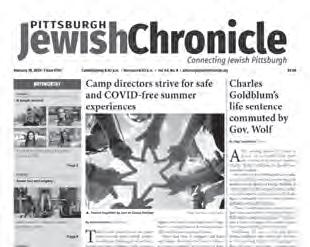


By Adam Reinherz | Senior Staff Writer
Seven short films delivered three prizes and one larger desire.
The movies, which were shown during the Robinson International Short Film Competition on May 27 at Carnegie Museum of Art Theater, were chosen from a group of 112 entries submitted by filmmakers from Austria, Canada, Cyprus, Egypt, France, India, Israel, the Netherlands, United States and Uzbekistan, Heather Robinson said. After a selection committee culled the entries, “We voted for what we thought were the best, and those are the films we’ll be seeing tonight.”
The seven films played during the evening event were “Friday Night Flop,” “The Ice Cream Man,” “Our Neighbor’s Ass,” “Psalms,” “The Sacred Society, “The Source of All Beauty” and “Torn (London).”
The commonality, Robinson explained, was a commitment to Jewish themes.
Named for her father, Sanford Robinson Sr., the Robinson International Short Film Competition celebrates Jewish-themed short films from around the world.
“My father was proudly Jewish, and he believed in continuing our traditions,” Heather Robinson said. “He believed it was important to have faith in God and to main tain our identity as a unique people.”
At the same time, he was “very much a humanist and a humanitarian,” she continued. “He believed we are all in this together.”
Speaking before nearly two hundred attendees in Oakland, Heather Robinson pointed to current communal challenges.
“I think at a time of rising antisemitism — there’s so much misinformation out there, including about what’s happening in the Middle East — it’s important for us to be proudly Jewish, to stand for Israel’s self-defense. It’s a value we believe in,” she said.
“We also believe in retaining our humanity and compassion for all innocent people on all sides of war. And, even as we respect and have the self-respect to defend ourselves, we grieve for all innocent people, children, and we pray for peace. I know that’s something my father stood for.”
Following completion of the final short, and more than two hours after Robinson’s remarks, winners were announced.
“Our Neighbor’s Ass” and “The Source of All Beauty” each received a silver prize and $6,000.
“The Ice Cream Man,” a 34-minute film about Ernst Cahn and his choices after Nazis invaded the Netherlands, was declared the gold prize winner and received $10,000.
Robert Moniot, the film’s director, called the award a “complete shock.”
Moniot told the Chronicle that the cash prize will be immediately applied toward his
next project; he also credited members of the Robinson family and event organizers with recognizing the importance of film.
Moniot’s winning short follows the horrifying experiences Cahn endured during the Holocaust. Cahn, a Jewish business owner beloved by his Amsterdam neighbors, was singled out and targeted by Klaus Barbie, a German officer of the Schutzstaffel and Sicherheitsdienst, who was known as “the “Butcher of Lyon” for having personally tortured Jews and other resistance fighters.
“I’m not Jewish,” Moniot said. “So many of my Jewish friends are so steeped in Holocaust stories, either because of their family connection or just what they were taught in school. All the people I grew up with know nothing except ‘Schindler’s List.’”
Telling a story about Dutch resistance during World War II — and the Germans’
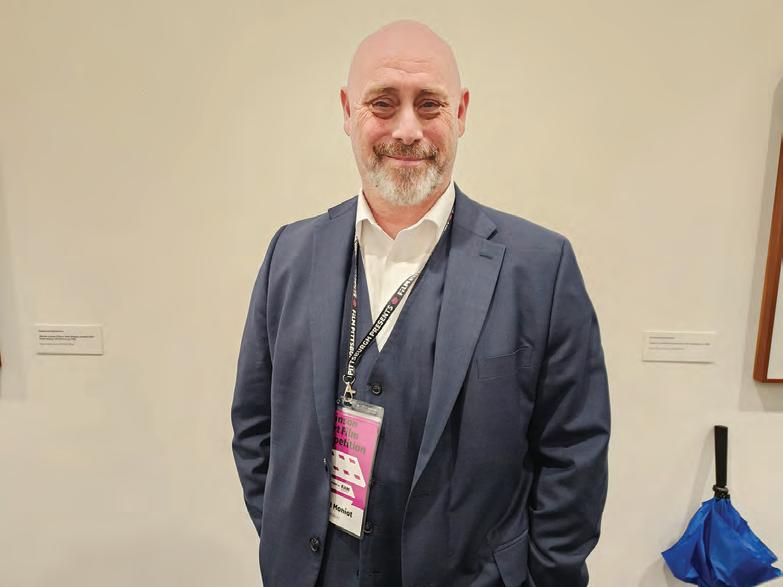
“If you can get to them with stories like this — of good versus evil, someone doing the right thing, what do you choose when you don’t have a choice — I think you can change kids’ perspectives.”
–ROBERT MONIOT
brutal response — is essential, especially for children who aren’t steeped in Holocaust education, Moniot said. “If you can get to them with stories like this — of good versus evil, someone doing the right thing, what do you choose when you don’t have a choice — I think you can change kids’ perspectives. And if you get to them early enough, I think it’ll stick. If you don’t do that, then we’re going to keep seeing all the hate, and all the division, and all the horrific things that are happening all around the world and have been for millennia.”
The propulsion of hate “has to stop,” Moniot said. “And as a filmmaker, there’s only one thing you can do: You can try to tell a story in a way that’s going to sink in and grab you.”
Along with creating the film, Moniot said he’s partnered with educators to develop an age-appropriate curriculum to accompany the movie.
Moniot, who was slated to return to Europe soon after the competition, said he’s eager to bring the short to as many schools and museums as possible.
Judy Robinson, whose late husband was Sanford Robinson Sr., told the Chronicle how impressed she was by “The Ice Cream Man” and the sellout crowd.
“I have so many feelings about the Holocaust and the past, but it’s important to focus on what’s going on in the world,” she said before joining family members, friends and program attendees at a post-film celebration inside the Carnegie Museum of Art.
“I’m terribly worried about Israel,” she said. “I feel the situation is getting worse at the moment. It’s a challenge to be a Jewish person, but I think we have to remain strong. We must recognize that we are still a people. We have had a tragic history — like no other people in the world — and we’ve survived so much. We will survive.” PJC
Adam Reinherz can be reached at areinherz@pittsburghjewishchronicle.org.
By Rosario Del Valle | JTA
BELFAST, Northern Ireland — On Saturdays, the Jewish day of rest, there is barely a quorum of 10 for prayers at the old synagogue in Northern Ireland’s capital city. But every other Wednesday, the place is hopping. A gaggle of seniors gathers for lectures, conversation, lunch and socializing. Only some of them are Jewish.
“I come here mostly for company. I see my friends, and I enjoy the talks. It gets me out once a fortnight,” said Norma Simon, 94, one of the members of the synagogue, on a recent Wednesday.
Her Catholic companion, Eleanor Minahan, said she appreciated the company she finds at the Belfast Hebrew C ongregation. “Most of the people that I meet here, I don’t meet in any other circumstances,” she said.
The neighborly vibes offer a contrast to tensions swirling outside and around the synagogue, the only Jewish house of worship in Northern Ireland. There, as in the Republic of Ireland to the south, proPalestinian sentiment is strong




— as exemplified by the Belfast band Kneecap, which projected the phrase “F–k Israel. Free Palestine” at the Coachella festival last month. Jewish leaders say antisemitism is on the rise. Earlier this month, an object was thrown through the window of the synagogue, which is located in a mixed but predominantly Catholic neighborhood in North Belfast. Two girls were cautioned by the police, according to Michael Black, the congregation’s deputy chairman, and the damage caused will total over £600.



Breaking Down the Walls 2025



Thank you to our sponsors for their generous support of Breaking Down the Walls.


LEAD SPONSORS Robert Levin and Kerry Bron, M.D.
EVENT CO-CHAIRS:
D. Silk
Phyllis Wechsler
2025 KRAUSE HONOREE: EJ Strassburger
2025 HOGAN HONOREE: Crystal Ritter
OVERALLS The Plung Resnick Family
Phyllis and Lawrence Wechsler, M.D. Pedal Pushers
Berger and Green
Kathy Krause
Leonard D. Silk
BELL BOTTOMS
UPMC Western
Behavioral Health and Community Care
Behavioral Health Organization
BOOTCUT
Sheila Reicher Fine
“My original thought was that this was inevitable,” Black said. He added, “In my lifetime, I don’t remember so much open antisemitism.”
Black said the synagogue has received hateful emails and phone calls. He said it has been experiencing “more verbal abuse than physical fear,” and he does not currently believe there is a lethal threat to his community.
“There’s an awful lot of virtue signaling and a lot of useful idiots who swallow the propaganda coming. That’s all. It’s getting worse,” he said. But he added that he worried that verbal
The Posner Foundation of Pittsburgh
Strassburger McKenna Gutnick & Gefsky
The Whitehill Family
DENIM
Andrea Solomon-Eller and Andrew Eller
Tom and Cheryl Fogarty, Ed.D. Havenside Construction Group
Jewish Healthcare Foundation
Rita and Andrew Rabin
Deborah Rubin
Michele Ferrier and Andrew Stewart
Rick and Shari Sweet
The Sol & Tina P. Waxman Family Foundation
CUT OFFS
Nancy E. Gale
Susan and Farrel Gerber
H2R CPA
Hurwitz Employment Fund
Anne Witchner Levin and Michael Levin
abuse could morph into something more dangerous, as happened in the Holocaust.
“It all started like this. It all starts with words. Then you get the blame,” he said, adding, “It’s worrying that there are signs that it could happen again.”
Yet the community’s safety concerns are only one of several pressing challenges imperiling the congregation’s future. t must also contend with a dwindling Jewish population, a deteriorating building, nd a struggle to recruit a new spiritual leader.
David Kale, who has led Belfast Hebrew Congregation for six years, is leaving his role. Black and other community leaders are aiming to install a rabbi who is outgoing and “receptive to other groups of Jews” by next month — but they haven’t y et landed the ideal candidate. They are looking for someone who can lead prayers and teach classes as well as help the chevra kadisha, a volunteer group that helps prepare the dead for a Jewish burial. Additionally, the community hopes to reach out to Jewish students at Queen’s University Belfast with the hope that they will use the space for meetings and Shabbat dinners on Fridays.
Cathy Green Samuels and Michael Samuels
David Sufrin and Diane Samuels
SKINNY JEANS
ACTION-Housing, Inc.
Anonymous Board Member
Janice and Nathan Bahary
Betsy and Marc Brown
Beth Hamedrash
Hagodol - Beth Jacob
Congregation
Judy Greenwald Cohen
Amy and Gary Dubin
Ilene and Jay Fingeret
Lori and Richard Guttman
Hoffman Consulting
The Jewish Chronicle
Susan and Louis Leff, M.D.
Karen J. Levin
Littles Shoes
Judy Ryave McGuire
Rae-Gayle and Mitchell Pakler
Mutual of America
Lorrie Rabin and Paul Pitts
The Rosenberg Food Group
S&T Bank
Ralph Schugar Chapel
Beatrice Schutte Foundation
Pat & Alan Siger
Squirrel Hill Urban Coalition
Carol Tabas
Joyce and Harvey Tyson
Cindy Berg
Vayonis
Verland
The Wagner Agency
Martha and John M. Wolf, Jr.



Giant Eagle Foundation
The Pollon Family
Lisa and Lee Oleinick Pechersky Orthodontics
Reid Roberts and Theresa Greco




By Olivia Haynie | Forward
World War II isn’t a new subject for historian Lynne Olson. But her latest book, “The Sisterhood of Ravensbrück,” covers the unique story of the war’s only all-female concentration camp.
Olson, who previously worked for the Associated Press and the Baltimore Sun, wrote her most recent two books — “Madame Fourcade’s Secret War” and “Empress of the Nile” — about French women who participated in the resistance against Nazi rule. While researching these books, Olson came across the story of resistance fighter and anthropologist Germaine Tillion, who was sent to the Ravensbrück concentration camp. Olson quickly found herself pulled into the story of how the camp’s prisoners created a loving community amid abhorrent conditions.
Centered around the camp’s four main leaders, Tillion, Anise Postel-Vinay, Geneviève de Gaulle and Jacqueline Péry d’Alincourt, “The Sisterhood of Ravensbrück” is a detailed account of the women’s activism before, during and after their internment in the camp. Despite camp officials’ attempts to foster animosity between the different nationalities at Ravensbrück — which included French, Polish, German and Czech prisoners — the women ignored these differences to help each other survive the forced labor, medical torture, and generally brutal conditions that they were subjected to, whether through lying, providing hiding spots or sneaking goods to one another.
Olson says that this widespread camaraderie wasn’t as common in coed or all-male concentration camps and attributes that fact in part to the role society ascribes to women.
“We’re brought up with the idea that we take care of people, that we take care of our families, we take care of friends,” Olson said. “There was just much more of a sense of that inculcated in these women.”
The women’s proclivity for caretaking is particularly evident in a scene where the women discuss the food they can’t wait to serve their husbands once they are free.
Although the four main women had passed away before Olson began the book, she was able to piece together their stories

using the women’s memoirs and “Sisters in Resistance,” Maia Weschler’s documentary about Ravensbrück.
“I really got a chance to, in their own words, to hear what they had to say about what had happened,” Olson said.
Despite their essential role in the resistance movement, these women have often been overlooked. In the book, Olson notes that out of the 1,038 admitted in 1940 to Charles de Gaulle’s Compagnons de la Libération, an order honoring resistance fighters, only six were women. Although more attention has been paid to female resistance fighters in recent years, it’s not nearly enough considering the work they did, Olson says.
Olson describes Ravensbrück as “a forgotten camp,” saying that it has not received as much attention as other concentration camps.
“The concentration camps we’re familiar with now like Dachau and Buchenwald were liberated by American troops, so there were a lot of American journalists covering the story,” Olson said. “Ravensbrück was liberated by the Soviets.”
Ravensbrück was also liberated later than many of the other camps, only six days before the war ended in Europe.
“People were not interested in focusing on the horrors at that point,” Olson said. “They were really interested in getting this war over and getting back to normalcy.”
For those who had survived the camps,
forgetting the horrors wasn’t an option. After the war, the women of Ravensbrück stayed active in the fight for justice, helping create the National Association of Former [Female] Deportees and Internees of the Resistance, which provided female concentration camp victims with medical care, shelter and employment.
“They were traumatized, obviously, by what happened,” Olson said. “But the fact that they could get over it enough to not only to help themselves, but to have children, to have a happy home life, and to help others — that was what was so impressive to me, that they didn’t turn inward.”
Germaine Tillion, whose background in anthropology had moved her to keep
detailed notes of the horror she witnessed at Ravensbrück, was instrumental in the prosecution of a number of the camp’s officials and the execution of two: Commandant Fritz Suhren and Hans Pflaum, the camp’s SS supervisor.
In the story of Ravensbrück, Olson sees a broader message about the nature of resistance.
“Ordinary citizens, no matter how horrible the situation they find themselves in,” she said. “They can actually make a difference if they come together.” PJC
This story was originally published on the Forward. To get the Forward’s free email newsletters delivered to your inbox, go to forward.com/newsletter-signup.








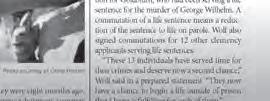

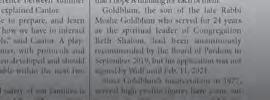


Lydia Gordon, daughter of Bonnie and Greg Gordon of Mt. Lebanon, will become a bat mitzvah on Saturday, June 7, 2025, at Beth El Congregation of the South Hills. Grandparents are Dottie Goldstein and the late Harvey Goldstein of Pittsburgh, and Sandra Gordon of Virginia Beach, Virginia.

Claire Louise Janavitz, daughter of Seth and Elizabeth Janavitz, will be called to the Torah to become a bat mitzvah on Saturday, June 7, 2025, at Rodef Shalom Congregation. Claire’s simcha is celebrated by her younger sister, Annie, her grandparents Gloria Janavitz and the late Carl “Toby” Janavitz of Pittsburgh, Margaret Winch and the late Donald Winch of Salem, Ohio, as well as her entire extended family. Claire is a seventh grader at the Ellis School where she is a member of the middle school varsity tennis team. Outside of school, Claire enjoys rowing for Three Rivers Rowing Association, reading a wide variety of books and spending time with friends and family. Claire’s mitzvah project has been volunteering at Our Giving Kitchen where she has been able to give back using her love of cooking and baking as well as her artistic spirit. Over the course of the year, Claire has prepared meals, baked cookies, created jewelry, key chains, blankets and activity bags for organizations including the Womanspace shelter, JFCS Refugee Services, Veterans Place, Friendship Circle



While some might jokingly refer to Shavuot as International Cheesecake Day, the holiday we celebrated earlier this week holds a far deeper significance. It truly commemorates the day we received the Torah from G-d on Mount Sinai, a divine guide for both the ordinary and unexpected moments in our lives. The reception of the Torah was an awe-inspiring event, described in the Torah as follows:
This distinction highlights a crucial point — not only of this article but also of the very purpose the Torah’s giving. The intention is not for us to withdraw from the world in pursuit of higher planes, but rather for the infinite wisdom and guidance of the Torah to permeate our everyday lives, bringing about practical change in our actions and activities.
Jewish tradition includes the custom of eating dairy foods on Shavuot, in addition to holiday meat (though not at the same time, G-d forbid). The principle “A Jewish custom is Torah” underscores the importance of these traditions.
In the year ahead, let’s strive to make our celebrations and meals more than just
“The entire nation saw the sounds, the lightning, the sound of the shofar and the mountain smoking.”
Within this brief description lies a profound message. Examining the Torah’s emphasis on the various phenomena, we notice a particular focus, not on the heavenly wonders of sounds, lightning and the shofar, but rather on the earthly occurrence of “the mountain smoking.” The Ohr Hachayim explains that this smoke emanated from a fire burning within the mountain itself, a tangible event affecting the physical world.
physically enjoyable. Consider using strictly kosher ingredients, infusing a sense of spiritual awareness into your preparations. Another meaningful practice is to eat with the intention of fueling your body for Torah study or performing mitzvot with greater enthusiasm. The essence is to elevate the ordinary aspects of our lives with holiness, giving them real meaning and purpose. PJC
Rabbi Dovie Kivman is executive director of Chabad of Erie County. This column is a service of the Vaad Harabonim of Greater Pittsburgh.


BLATT: Eileen H. (Greenwald) Blatt, age 83, of Squirrel Hill, passed away peacefully on Monday, June 2, 2025, surrounded by family. Beloved daughter of the late Sylvia and Edward Greenwald, wife of the late Alan L. Blatt, loving mother of David and Steven (Laura), sister of the late Louis (Janice). Grandmother of Sydnye (Sender), Joshua, Matthew and Jordyn (Ayal). She also leaves behind five great-grandchildren, nieces, nephews, cousins and friends. Eileen had a heart of gold and a secret wit about her. She spent many years behind the register of the produce store, J. Weisberg and Sons (Strip District), which she ran with her husband beginning in the 1980s. She loved corned beef sandwiches, shopping on QVC, dogs of all sizes and reading books from several genres. She will be greatly missed by all who knew and loved her, but most deeply by her devoted son Steven. Graveside service and interment were held at Temple B’Nai Israel Cemetery of White Oak (Elrod Cemetery). Donations may be made in Eileen’s name to either the American Stroke Association (stroke.org) or the Humane Animal Rescue of Pittsburgh (humaneanimalrescue.org). Arrangements entrusted to Ralph Schugar Chapel, Inc. schugar.com
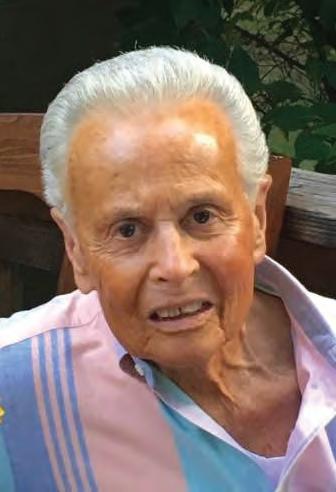
LETWIN: Myron “Buddy” Letwin, age 93, passed away peacefully on Thursday, May 29, 2025. Buddy was the beloved son of the late Rose and Sam Letwin, and a man whose warmth, humor and humanity left a mark on everyone he met. Known for his innate likability, Buddy lived by the golden rule: treat others as you would want to be treated. He never judged by title, background or circumstance — and his kindness earned him deep respect across Pittsburgh’s diverse communities. A devoted husband to Phyllis Letwin, his loving partner of 72 years, Buddy was a proud and devoted father to Jeffrey (Roberta), Sheri Letwin (David Berk) and Mitchell (Rhonda). He found his greatest joy in his grandchildren: Amanda Weiner (Jared of blessed memory), Ari Letwin, Andrew Filipek (Kaela), Rachel Jacoby (Michael), Ryan Letwin and Justin Berk (Talia); and his great-grandchildren: Jonah and Zoe Weiner, Mason and Riley Jacoby, and Jackson Filipek. He is the brother f his cherished sister, Judy Weinstein (Brian), and his late brother, Larry Letwin. Buddy was perhaps best known in Pittsburgh as the founder of The Listening Post, a fixture in Shadyside for more than three decades. What began as a hub for records, electronics and countercultural expression evolved into high-end audio destination — but it always remained a place where people felt welcome. Buddy’s warm presence and civic spirit earned him the affectionate nickname, “The Mayor of Shadyside.” Buddy was an avid Steelers fan and became friends with many of the players from the Super Bowl teams in the ’70s. In fact, many of them made sure he and Phyllis had tickets for all of the games. The Listening Post was even selected to run the music to the scoreboard. Besides being a really less than mediocre golfer after spending years practicing at Green Oaks, it was less known that he diligently maintained a daily fitness routine. His civic and cultural engagement ran deep. Buddy was an active supporter of Jewish causes and a contributor to B’nai Brith, Anti-Defamation League and United Jewish Federation. Buddy Letwin will be remembered for his joy in life, fierce devotion to family and unwavering belief in the dignity of all people. He will be deeply missed by his family, his friends and the caring staff of Weinberg Terrace. Services were held at Ralph Schugar Chapel, Inc. Interment Homewood Cemetery. Contributions may be made to Weinberg Terrace, 5757 Bartlett Street, Pittsburgh, PA 15217 or a charity of donor’s choice. schugar.com
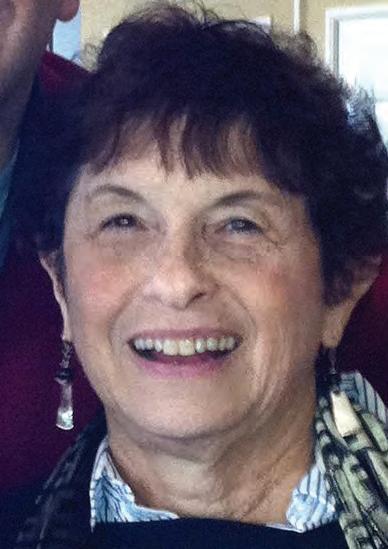
SPAHR: Judy Krause Spahr, age 85, passed away peacefully on June 2, 2025. Judy was an impassioned artist who could always be found happily creating masterful canvases with acrylic, watercolor and charcoal. She brought her passion for art to Carnegie Mellon University where she received her BA in fine arts and later became an accredited art teacher. Judy also dedicated herself to helping others with her Masters of Social Work from University of Pittsburgh that she used at McKeesport Hospital. In her spare moments, she was a part of U.S. Masters Swimming, and an active member at Rodef Shalom Congregation and the women’s group at Chabad of the South Hills. Judy was the daughter of the late Dr. Gilbert and Belle Krause, and identical twin sister of the late Trudy Kapner. She is survived by her brother Paul Krause and brother-in-law Leonard Kapner. Judy was the proud and devoted mother to Nathan (Jamie) Bennett, Steven (Terri Gomez) Bennett and David (Mindy) Bennett. She found her greatest joy in her grandchildren: Lexi, Elijah, Isabela, Gabriela, Elizabeth, Gregory, Shayna, Eliana and Bailey. Judy had a beautiful love for family and cherished all the moments growing up with her cousins, aunts, uncles and friends. Services were held at Ralph Schugar Chapel, Inc. Interment Beth Shalom Cemetery. Contributions may be made to The Branch (formerly Jewish Residential Services), 2609 Murray Avenue, #201, Pittsburgh, PA 15217. schugar.com PJC
Edris Weis

David Wolfson
Contact the Development department at 412-586-2690 or development@jaapgh.org for more information. THIS WEEK’S YAHRZEITS —
Sunday June 8: Edward Balter, Edith Rodney Berman, Lillian Cazen, Jacob Dickman, Ethel Sofer Frankel, Fannie Gordon, Morris Oberfield, Charles Zola Pollock, Leonard Robinson, Herman Shapiro, Isadore Thomashefsky
Monday June 9: Rebecca Adler, Nellie Bricker, Anne Stein Fisher, Samuel Hankin, Albert Jacobson, Freda Miller, William Moldovan, Rose Rattner, Norma Rosenstein, Samuel Rotter, Martin Rubin, Blanche Sigel, Seward Wilson, Fannie Wolk
Tuesday June 10: Sarah Lee Backal, Irving H Cohen, Robert Allen Cohen, Lena Davidson, Robert (Bob) Feinberg, David Friedman, Elsie Lichtenstul Goldbloom, Tillie Gordon, Marjorie Leff, Morris Hyman Leff, Fannye B Mermelstein, Freda Oawster, Phillip Pattak, Samuel Schneirov, Florence Sherwin, Morris Thomashefsky
Wednesday June 11: Lillian Amper, Beatrice K Barnett, Dr Milton Bilder, Meyer M Braun, Yetta Elinoff, Belle Farber, Ida A Friedman, Leonard Hyman Gettleman, I . Max Greenfield, Charles L Jacobs, Stella Leedy, Carl Lipson, Ralph Leon Markowitz, Cele Monheim, Alta M Orringer, Morris Shakespeare, Sarah Teplitz, Sara Weinberg, Barry Yahr
Thursday June 12: Sybil B Berkman, Florence Boodman, Herman Braunstein, Sherman B Golomb, Michael David Levine, Louis Rider, Cecelia M Schmidt, Libbie R Seiavitch, Hilda Z Silverman, Gertrude Simon, Irving Spolan, Sara Titlebaum, Abraham Weiner, Chava Wekselman
Friday June 13: Jennie Bleier, Jacob Garber, Mayme Gerson, Morris B Green, Lillian Handmacher, Leah Kramer, Helen Langer, Robert Langer, Samuel A Lichter, Abe Mazer, Abraham Rothenstein, Morris A Schwartz, Betty Silberblatt
Saturday June 14: Israel A Brahm, Howard Finkel, Tillie L Gallagher, Dr Harold Saul Kaiser, Leroy A Klater, Jack Masloff, Fannie Miller, David Reubin, Anshel Rosen, Sylvia Rosenblum, Minnie Schilit, Benjamin B Sklar, Sidney Whitman
















By Vita Fellig | JNS
Tarek Bazrouk, of New York City, who is awaiting trial in the U.S. District Court in the Southern District of New York on three hate crime charges for alleged “repeated assaults” on Jews in 2024 and 2025, has direct ties to Hamas’ so-called military wing Al-Qassam Brigades, according to the federal charges.
The New York Post reported exclusively on sealed parts of the criminal complaint, which it said alleged that the 20-year-old was a “member of a chat group that received regular updates from Abu Obeida,” the spokesman for the Al-Qassam Brigades. (JNS sought comment from the U.S. Justice Department.)
The defendant, who wasn’t enrolled at Columbia University, attended antisemitic protests on the Manhattan school’s campus in April 2024. The Justice Department has alleged that Bazrouk’s phone was “littered with pro-Hamas and pro-Hezbollah propaganda, showing his support for orga nizations that have murdered thousands of Jews and Israelis.”
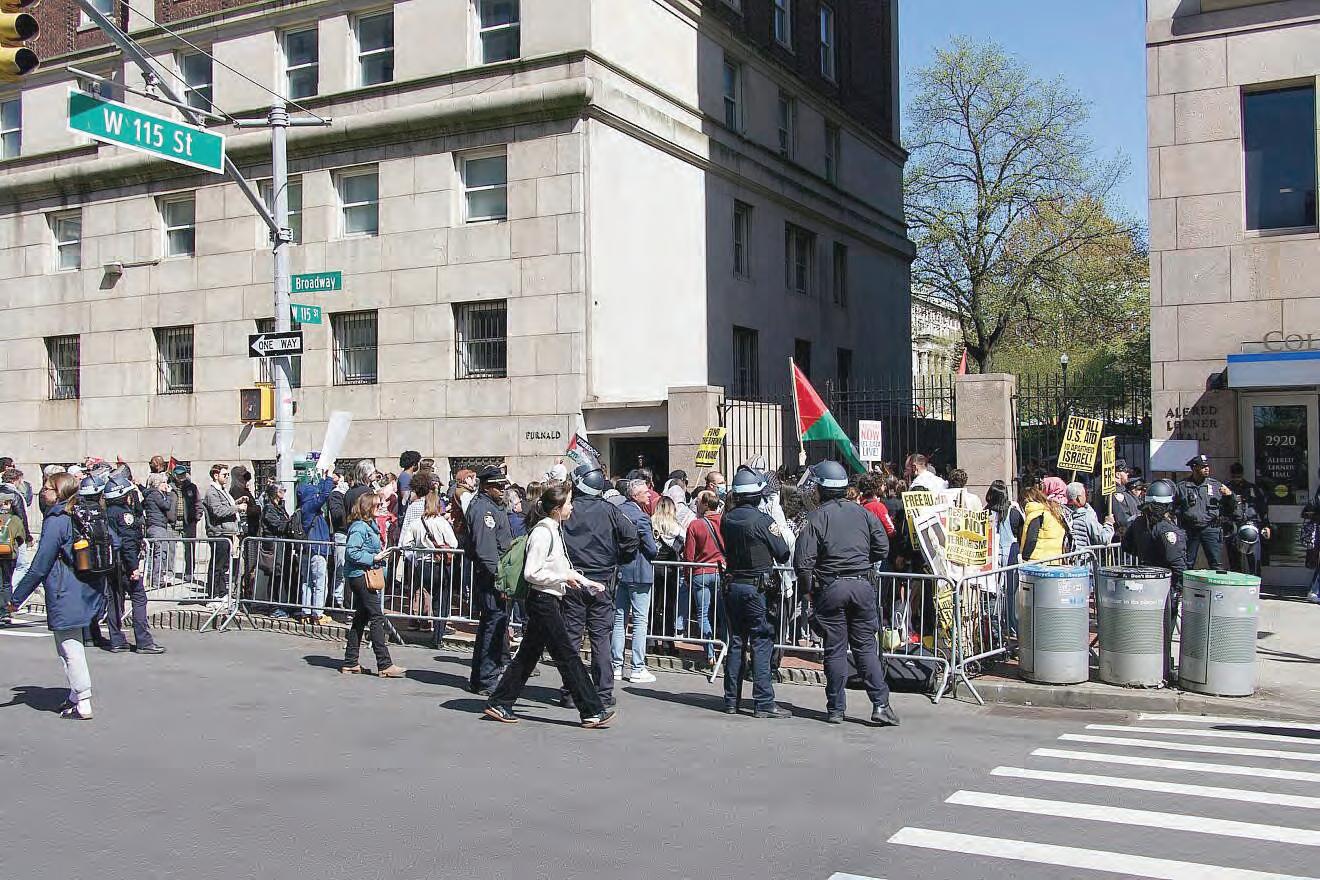
It also said that “antisemitic bias” and “support for anti-Jewish terrorist groups,




and that he allegedly referred to himself as a “Jew-hater,” called Jews “worthless” and asked “Allah” to “get us rid” of Jews. He also









learn that relatives overseas were members of Hamas, per the Justice Department.
While on Columbia’s campus during the April 2024 protests, he told a friend that he thought of lighting someone on fire and “would’ve” hurt them, but there were “too many” others around for him to act, the Post reported, citing court documents.
A Columbia spokesperson told JNS of Bazrouk, “We have no record of this individual ever being on Columbia’s campus.”
“Columbia strongly condemns antisemitism and violence, and we are horrified by the violence and hate crimes described in the indictment,” per the spokesperson, who declined to be named.
Bazrouk was arrested on May 7 and charged with three federal hate crimes. He faces up to 30 years in prison for allegedly assaulting Jews outside the New York Stock Exchange on April 15, 2024, near Columbia on Dec. 9, 2024, and in the Gramercy Park neighborhood on Jan. 6.
“The proof is undeniable. Antisemitism on
driven by outside agitators who want to ensure hatred festers and deliberately harm the United States,” the House Committee on Education and the Workforce stated in response to the Post story. “Schools have to do more to stop this kind of hateful antisemitism and protect Jews on campus.”
Robert Holden, a New York City Council member, stated that “this confirms what many of us suspected.”
“These protests weren’t just organic movements. They were infiltrated by individuals with ties to terror groups. It’s disturbing, dangerous and a wake-up call,” he wrote.
“The government must treat this as the serious national security threat it is.”
“I wonder how many protestors and professional agitators in Chicago this applies to as well,” wrote Raymond Lopez, a Chicago alderman, tagging the Chicago police, the U.S. Department of Homeland Security and the Chicago offices of the FBI and of the Bureau of Alcohol, Tobacco, Firearms and Explosives. PJC

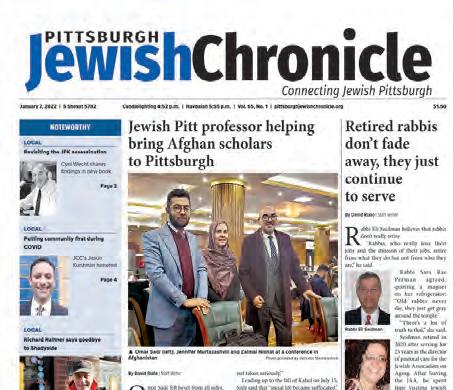



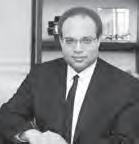





Smith-Rosenthal Team
Jason A. Smith & Caryn Rosenthal Jason: 412-969-2930 | Caryn: 412-389-1695 Jasonasmith@howardhanna.com Carynrosenthal@howardhanna.com

Baum Blvd.
Office | 412-361-4000

Mayer, Realtor Squirrel Hill Office C: 412-760-0412 O: 412-421-9121x225 sherrimayer@howardhanna.com HowardHanna.com






pittsburghjewishchronicle.org
pittsburghjewishchronicle.org















































Synagogue:
Continued from page 16
It’s a tall order for a community that is, by all accounts, a shell of its former self. Belfast was the pulpit of Isaac Herzog, a chief rabbi of Israel and the grandfather of the current Israeli president of the same name, from 1916 to 1919 before he moved to Dublin and became the chief rabbi of Ireland. The community swelled before, during, and immediately after World War II, thanks to the arrival of Jewish refugees from Eastern Europe, reaching a peak in the 1950s of more than 1,500 members.
The local Jewish population was already in decline when the Belfast Hebrew Congregation was built in 1964 as a house of worship with a capacity of 1,500. The exodus accelerated with the onset of the Troubles, the period of violent conflict between Protestants and Catholics between the late 1960s and 1998.

around the space.
“That was our future generation — gone,” said Ivonne Danker, an active member of the Belfast Jewish Community.
Today, the synagogue serves only 54 active members, mostly retired people with no children. Services are held weekly on Saturday and on major holidays. Over the years, the synagogue was renovated so that there is less room for worship and more space for meetings and social activities.
“When everybody left, we condensed it, we built this wall, and we turned this into a functions room,” Danker said, gesturing
There is little possibility of a rebound. Only 439 people identified as Jewish in the latest Northern Ireland census, taken in 2021, out of a total population of nearly 2 million.
The neighboring Republic of Ireland has more than 2,000 Jews among a population of around 5.3 million.
Those small numbers leave neighbors as the best option for keeping the building in use.
While many in Northern Ireland are sympathetic to the Palestinians, the local sectarian history has led others to staunchly support Israel, as well. The evangelical Christian community and other churches have also expressed solidarity with the members of the
Expert veterinary tele-heath service immediately connects you to your regular veterinarian or a local vet they know. Annual subscriptions & single consultations. Cats too!



Belfast Hebrew Congregation, including after the recent vandalism.
About 30 seniors, in their 70s, 80s and 90s, join the biweekly meetings of what is called “Wednesday Club.” Common activities include lectures on a wide range of topics such as Irish history, playing trivia games, listening to music and sharing a meal. By talking about topics that are common to adherents of any faith, the community tries to find common ground with its non-Jewish neighbors.
“[The meetings] are informative, entertaining, sometimes boring,” said Hilary Shields, who attends an Anglican church. “They make us feel very welcome, and it’s nice to be with friends.”
The Belfast Jewish Community & Hebrew Congregation started the meetings in 2009 to encourage people to spend more time together and connect with those outside of the Jewish community.
The goal was “to stop just being inwardlooking, to be more outward-looking,” said Jane Danker, the organizer (who is not closely related to Ivonne Danker). “And as you can see, we all mix and match.”
In addition to the Wednesday Club program for seniors, the synagogue gets visitors from Northern Ireland and abroad who are interested in learning about Judaism. On a recent spring day, Black gave a tour to a group of 21 American students visiting from Middlebury College in Vermont. He showed them the sanctuary, which faces Jerusalem, and the Holy Ark, which contains the Torah scrolls.
The visit of the group, composed of students and professors from the class “Conflict: Transformation in Northern Ireland,” ended at the Yahrzeit Wall, where the names of the deceased are commemorated by the community. There, Black explained that on the anniversary of a loved one’s passing, a memorial light is lit in their memory.
Soon, he understands, the entire congregation could go the way of those it remembers. Black imagines the synagogue could become a cultural center, a museum and an educational center — though because it is deemed a historic site, it requires government permission for alterations.
“I think it’s only a matter of time before we disappear as an Orthodox community,” said Black. “I would like to leave a legacy.” PJC


We at the Pittsburgh Jewish Chronicle are working hard to continue to make our publication even more relevant to your needs, and your feedback is important to us. Could you please spare a few minutes to take a brief survey? It shou Id take no more than

5-8 minutes to complete. Your input will help us ensure that during these challenging times the Chronicle continues to serve you and our community in meaningful ways. In appreciation of your help, you will be eligible to enter a drawing for a $100 Giant Eagle gift card.
Visit https://survey.zohopublic.com/zs/jQD9gb to let us know what you think. Or scan this QR code:

The other canvassing AgeWell at the JCC welcomed members for a splash of creativity and socialization with an Open Art Studio.

Tasty trip
During their visit to Israel, Hillel
students stopped for a delicious meal.
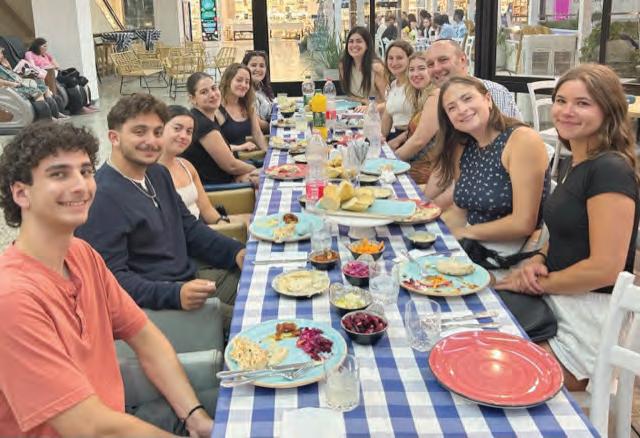


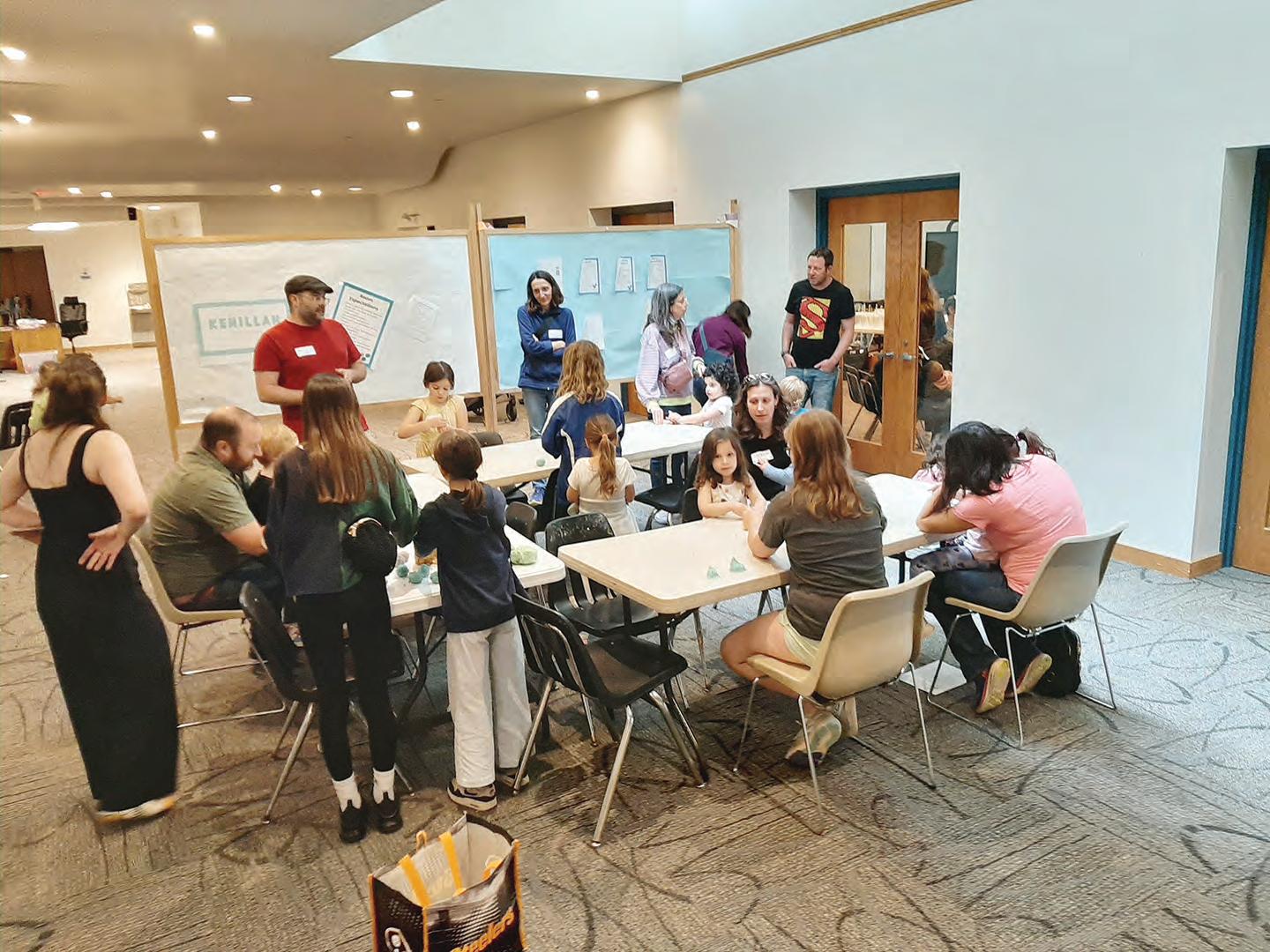

• Volunteers must be 18 or older
• Volunteer for 4 hours, one day or whole week
For more information: Leah Gelman, Assistant Games Director, lgelman@jccpgh.org















